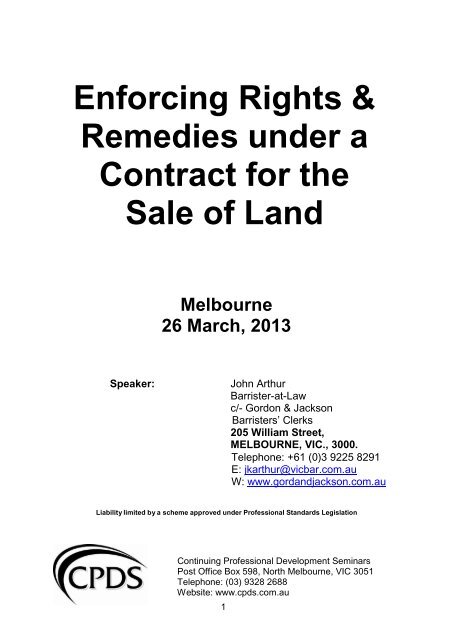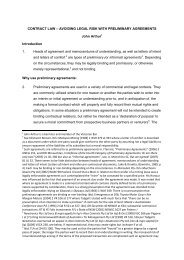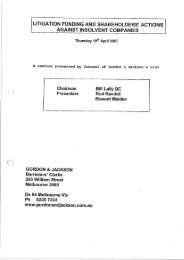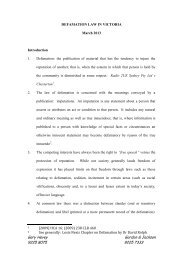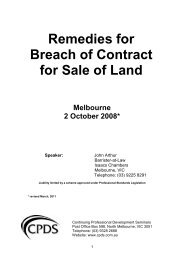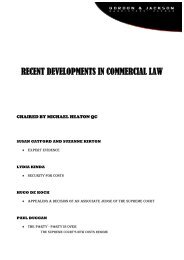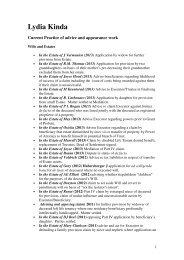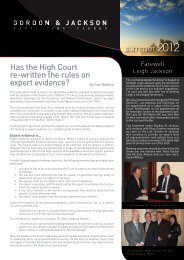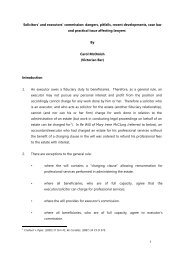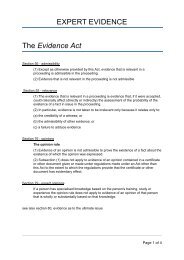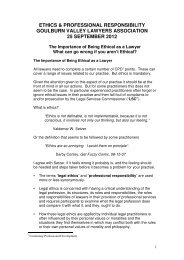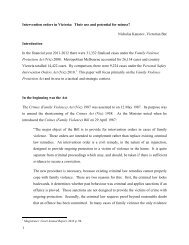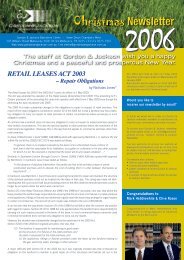Enforcing Rights & Remedies under a Contract for the Sale of Land
Enforcing Rights & Remedies under a Contract for the Sale of Land
Enforcing Rights & Remedies under a Contract for the Sale of Land
Create successful ePaper yourself
Turn your PDF publications into a flip-book with our unique Google optimized e-Paper software.
<strong>En<strong>for</strong>cing</strong> <strong>Rights</strong> &<br />
<strong>Remedies</strong> <strong>under</strong> a<br />
<strong>Contract</strong> <strong>for</strong> <strong>the</strong><br />
<strong>Sale</strong> <strong>of</strong> <strong>Land</strong><br />
Melbourne<br />
26 March, 2013<br />
Speaker:<br />
John Arthur<br />
Barrister-at-Law<br />
c/- Gordon & Jackson<br />
Barristers’ Clerks<br />
205 William Street,<br />
MELBOURNE, VIC., 3000.<br />
Telephone: +61 (0)3 9225 8291<br />
E: jkarthur@vicbar.com.au<br />
W: www.gordandjackson.com.au<br />
Liability limited by a scheme approved <strong>under</strong> Pr<strong>of</strong>essional Standards Legislation<br />
Continuing Pr<strong>of</strong>essional Development Seminars<br />
Post Office Box 598, North Melbourne, VIC 3051<br />
Telephone: (03) 9328 2688<br />
Website: www.cpds.com.au<br />
1
Table <strong>of</strong> Contents<br />
Introduction …………………............................................................ 3<br />
The right <strong>of</strong> rescission<br />
……………………………………………..3<br />
The different meanings <strong>of</strong> <strong>the</strong> word “Rescission” …............................ 4<br />
Rescission <strong>for</strong> breach <strong>of</strong> condition or breach <strong>of</strong> an essential term 5<br />
Vitiating factors which give a right to rescind ……………………..8<br />
Statutes which give a right to rescind ………………………………….. 8<br />
Acceptance <strong>of</strong> repudiation …………………………………….. 9<br />
Statutes which create causes <strong>of</strong> action <strong>for</strong> statutory<br />
misrepresentation or misleading and deceptive conduct ...........10<br />
Mutual abandonment/discharge by agreement ………………… 11<br />
Essential pre-requisites to <strong>the</strong> exercise <strong>of</strong> a right to rescind ......... 11<br />
Loss <strong>of</strong> <strong>the</strong> tight to rescind – common law/equity and statute … 13<br />
The consequences <strong>of</strong> rescission ........................................................ 13<br />
Relief from <strong>for</strong>feiture in favour <strong>of</strong> a purchaser following a valid<br />
termination <strong>of</strong> a contract by a vendor ................................ 14<br />
Tanwar – Victorian Position .................................................................... 15<br />
O<strong>the</strong>r <strong>Remedies</strong> - introduction ....................................................... 17<br />
Damages in contract ………………………………………………………. 17<br />
Vendor’s right to damages ................................................................... 19<br />
Purchaser’s right to damages .............................................................. 24<br />
Specific per<strong>for</strong>mance ............................................................................... 26<br />
Injunction .................................................................................................. 29<br />
Conclusion ……………………………………………………………………… 30<br />
Bibliography ............................................................................................... 32<br />
2
Introduction:<br />
1.1 Traditionally a distinction is drawn between a right and a remedy. A right 1 is<br />
viewed as a prerequisite to a remedy, thus <strong>the</strong> maxim <strong>for</strong> every right <strong>the</strong>re is<br />
a remedy 2 . The right is <strong>the</strong> primary, and <strong>the</strong> remedy is <strong>the</strong> secondary,<br />
obligation. The right and <strong>the</strong> remedy “combine to define <strong>the</strong> plaintiff’s<br />
claim” 3 . In contract, <strong>the</strong> parties’ primary obligations will be defined by its<br />
express and implied terms. In <strong>the</strong> event <strong>of</strong> breach <strong>the</strong> court may be able to<br />
en<strong>for</strong>ce a primary obligation by ordering specific per<strong>for</strong>mance, but more<br />
commonly it will give rise to a secondary obligation to pay damages and if<br />
sufficiently serious, may relieve <strong>the</strong> o<strong>the</strong>r from fur<strong>the</strong>r per<strong>for</strong>mance 4 . There<br />
is also <strong>the</strong> distinction between remedies and procedure. <strong>Remedies</strong> are <strong>the</strong><br />
ends which <strong>the</strong> administration <strong>of</strong> justice seeks to achieve and <strong>the</strong> procedure<br />
is <strong>the</strong> means <strong>for</strong> achieving those ends 5 . <strong>Remedies</strong> may be classified as<br />
substitutional, specific or declaratory; in personam or in rem. Some are<br />
discretionary and while o<strong>the</strong>rs as <strong>of</strong> right. <strong>Remedies</strong> may have legal,<br />
equitable or statutory origins 6 .<br />
1.2 Where a contract <strong>for</strong> <strong>the</strong> sale <strong>of</strong> land “goes <strong>of</strong>f” by reason <strong>of</strong> one party’s<br />
default or breach, <strong>the</strong> remedies which may be available to <strong>the</strong> innocent party<br />
will depend upon <strong>the</strong> right infringed and will include, rescission, termination,<br />
damages or specific per<strong>for</strong>mance, as well as analogous remedies <strong>under</strong> <strong>the</strong><br />
<strong>Sale</strong> <strong>of</strong> <strong>Land</strong> Act 1986 (Vic)(SLA) and <strong>the</strong> Australian Consumer Law (ACL) 7 .<br />
The party may need to invoke <strong>the</strong> remedy <strong>of</strong> rectification or in some<br />
circumstances, o<strong>the</strong>r ancillary equitable remedies, such as an injunction.<br />
1.3 In this seminar, <strong>the</strong>re will be a general discussion about <strong>the</strong> remedies<br />
available <strong>for</strong> breach <strong>of</strong> contract <strong>for</strong> sale <strong>of</strong> land, identifying <strong>the</strong> circumstances<br />
where <strong>the</strong>y may become available and <strong>the</strong> pre-conditions to <strong>the</strong>ir grant.<br />
1 A right is thought <strong>of</strong> as synonymous with a cause <strong>of</strong> action but is not in itself a chose in action (as to<br />
which, see note 8). Ra<strong>the</strong>r <strong>the</strong> existence <strong>of</strong> a chose in action is conditioned upon <strong>the</strong> existence <strong>of</strong> a<br />
remedy: Investors Compensation Scheme Ltd v West Bromwich Building Society (No.1) [1998] 1 W.L.R.<br />
896 at 915; [1998] 1 All E.R. 98 per Lord H<strong>of</strong>fmann and see Principles <strong>of</strong> <strong>Remedies</strong>, Covell & Lupton, Lexis<br />
Nexis B/worths, 2008, pp. 3-6<br />
2 Or as it may be restated “equity will not suffer a wrong to be without a remedy”<br />
3 <strong>Remedies</strong>, Commentary and Materials, Tilbury, Noone and Kercher, LBC, 3 rd Ed., 2000 at p. 4<br />
4 Photo Production Ltd v Securicor Transport Ltd [1980] AC 827 at 848 – 849 per Lord Diplock<br />
5 ibid, Covell & Lupton, p. 6<br />
6 ibid, Covell & Lupton, pp. 3-6; <strong>Remedies</strong>, Kercher & Noone, LBC, 1990, pp. 1-6<br />
7 The Australian Consumer Law (ACL) is Sched. 2 to <strong>the</strong> Competition and Consumer Act 2010 (Cth.) which<br />
is <strong>the</strong> reincarnation <strong>of</strong> <strong>the</strong> Trade Practices Act 1974 (Cth.).<br />
3
<strong>En<strong>for</strong>cing</strong> rights and remedies <strong>under</strong> a land contract is to be <strong>under</strong>stood in<br />
<strong>the</strong> sense <strong>of</strong> vindicating <strong>the</strong> right, and bringing about, or achieving, <strong>the</strong><br />
remedy.<br />
Rescission:<br />
1.4 Probably <strong>the</strong> most common, and arguably, <strong>the</strong> most important, right or<br />
remedy in <strong>the</strong> context <strong>of</strong> disputes relating to contracts <strong>for</strong> <strong>the</strong> sale <strong>of</strong> land<br />
is that <strong>of</strong> rescission or termination. Depending upon <strong>the</strong> circumstances, <strong>the</strong><br />
remedy may be available to ei<strong>the</strong>r vendor or purchaser. Often, <strong>the</strong><br />
determination <strong>of</strong> which party has this right is a “watershed” issue, which will<br />
determine what o<strong>the</strong>r rights or remedies flow; which <strong>of</strong> <strong>the</strong> parties is<br />
innocent; where <strong>the</strong> deposit should go and which party must pay<br />
damages. Often <strong>the</strong> question will simply be: by whose default did <strong>the</strong><br />
contract “go <strong>of</strong>f”?<br />
1.5 Ano<strong>the</strong>r incident <strong>of</strong> this remedy is that as is discussed below, loss <strong>of</strong><br />
bargain, or expectation 8 , damages are only recoverable if <strong>the</strong> contract is<br />
at an end.<br />
1.6 The failure to properly exercise <strong>the</strong> right, may result in it being lost, as well as<br />
<strong>the</strong> resultant remedy, and may also affect what o<strong>the</strong>r remedies are available.<br />
Accordingly <strong>the</strong> right must be validly exercised – clearly, unequivocally and<br />
in proper <strong>for</strong>m.<br />
1.7 A claim to rescission is a right <strong>of</strong> action but is not itself a chose in action 9 (and<br />
consequently cannot be assigned separately from <strong>the</strong> property affected by <strong>the</strong><br />
transaction that is sought to be rescinded) 10 .<br />
The different meanings <strong>of</strong> <strong>the</strong> word “rescission”:<br />
2.1 In <strong>the</strong> law, <strong>the</strong> word “rescission” is used in a number <strong>of</strong> different senses:<br />
8 “Expectation” damages are payable <strong>for</strong> <strong>the</strong> loss involved in non-per<strong>for</strong>mance <strong>of</strong> <strong>the</strong> contract where<br />
such per<strong>for</strong>mance was ‘expected’ by <strong>the</strong> innocent party. Non-per<strong>for</strong>mance is <strong>the</strong> loss <strong>of</strong> a contractual<br />
promise which is a valuable right which must be compensated in damages representing <strong>the</strong> value <strong>of</strong> <strong>the</strong><br />
right: Marks v GIO Holdings Ltd (1998) (1998) 196 CLR 494; (1998) 158 ALR 333; 73 ALJR12; [1998] HCA<br />
699 per Gaudron at [12], [13]<br />
9 “A chose in action is property, something capable <strong>of</strong> being turned into money. Snell's Equity, 29th ed.<br />
(1990), p. 71 defines choses in action as "all personal rights <strong>of</strong> property which can only be claimed or<br />
en<strong>for</strong>ced by action, and not by taking physical possession:" ”Investors Compensation Scheme Ltd v West<br />
Bromwich Building Society (No.1) [1998] 1 W.L.R. 896 at 915; [1998] 1 All E.R. 98 per Lord H<strong>of</strong>fmann<br />
10 Ibid, Investors Compensation Scheme Ltd at 916 per Lord H<strong>of</strong>fmann<br />
4
(a) termination or discharge <strong>of</strong> a contract <strong>for</strong> breach <strong>of</strong> condition,<br />
breach <strong>of</strong> an essential term, or sufficiently serious non-essential<br />
term;<br />
(b) termination or discharge <strong>of</strong> a contract on <strong>the</strong> basis <strong>of</strong> a contractual<br />
condition which confers such right;<br />
(c) termination <strong>of</strong> a contract by reason <strong>of</strong> vitiating factors in its <strong>for</strong>mation<br />
which gives such a right at law or in equity;<br />
(d) termination or avoidance <strong>of</strong> a contract pursuant to a statute which<br />
confers such right;<br />
(e) termination following acceptance <strong>of</strong> repudiation; and<br />
(f) termination by mutual agreement or abandonment 11 .<br />
2.2 It should be noted that <strong>the</strong> use <strong>of</strong> <strong>the</strong> word “rescission” in contexts o<strong>the</strong>r than<br />
(c) above has been criticized on <strong>the</strong> basis that <strong>the</strong>re is a clear distinction<br />
between rescission, or more correctly, discharge, or termination <strong>of</strong> future<br />
obligations on <strong>the</strong> one hand, and rescission ab initio on <strong>the</strong> o<strong>the</strong>r 12 . Likewise<br />
it is suggested that despite a different usage in <strong>the</strong> past 13 , <strong>the</strong> word<br />
“repudiation” should be confined in its usage to where one party evinces an<br />
intention no longer to be bound by <strong>the</strong> contract 14 .<br />
3.1 Rescission <strong>for</strong> breach <strong>of</strong> condition or breach <strong>of</strong> an<br />
essential term:<br />
3.1.1 “Where a party to <strong>the</strong> contract, upon a breach by <strong>the</strong> o<strong>the</strong>r party <strong>of</strong> a<br />
condition, elects to treat <strong>the</strong> contract as no longer binding upon him ...<br />
<strong>the</strong>reupon both parties are discharged from fur<strong>the</strong>r per<strong>for</strong>mance <strong>of</strong> <strong>the</strong><br />
contract. But rights already acquired are not divested or discharged<br />
and causes <strong>of</strong> action which have accrued from <strong>the</strong> breach continue<br />
unaffected... The contract is... rescinded only ins<strong>of</strong>ar as it is executory<br />
and <strong>the</strong>reafter <strong>the</strong> party in default is still liable <strong>for</strong> damages” 15 .<br />
11 largely drawn from <strong>the</strong> meanings <strong>of</strong> <strong>the</strong> term identified by Meagher Gummow & Lehane, Equity<br />
Doctrines & <strong>Remedies</strong>, 3rd Ed, para 2401-2405<br />
12 eg. Photo Production Ltd v Securicor Transport Ltd [1980] AC 827 at 844; Halsbury’s Laws <strong>of</strong> Australia,<br />
para [110-9005]; <strong>Remedies</strong>, Kercher & Noone, 2nd Ed., LBC, pp. 257-258. In Victoria, in <strong>the</strong> General<br />
Conditions in <strong>the</strong> <strong>for</strong>mer Table A <strong>of</strong> <strong>the</strong> Seventh Schedule <strong>of</strong> <strong>the</strong> Transfer <strong>of</strong> <strong>Land</strong> Act 1958 (Vic) (“Table<br />
A”) (see clauses 6 and 7)(which in <strong>the</strong> past were incorporated into most land contracts in Victoria) <strong>the</strong><br />
word “rescission” and its derivatives are used in <strong>the</strong> senses referred to in (a) and (b) above, as <strong>the</strong>y are in<br />
<strong>the</strong> <strong>Sale</strong> <strong>of</strong> <strong>Land</strong> Act 1962 (SLA) (eg. ss. 9AE(1), 27(8)(b), 32(5)). Under <strong>the</strong> new standard contract <strong>of</strong> sale<br />
<strong>of</strong> real estate prescribed <strong>under</strong> <strong>the</strong> Estate Agents (<strong>Contract</strong>s) Regulations 2008 (see para 3.1.2 and notes<br />
16 and 17) <strong>the</strong> word “rescission” and its derivatives are no longer used being replaced by <strong>the</strong> word<br />
“ends” and its derivatives (see, “Cooling-<strong>of</strong>f period” notice to purchasers; GC5, 9.5, 12.2, 14.2, 28.2,<br />
28.328.4, 28.5). References hereinafter to <strong>the</strong> conditions <strong>of</strong> contract in <strong>the</strong> new standard contract <strong>of</strong> sale<br />
<strong>of</strong> real estate will be referred to as “GC”.<br />
13 eg. Bell v Scott (1922) 30 CLR 387 at 392, Knox CJ; Pips (Leisure Productions) Ltd v Walton [1980] 43<br />
P&CR 415; Valoutin Pty Ltd & Harpur v Furst, Tremback & Official Trustee in Bankruptcy (1998) 154 ALR<br />
119 at 150-51<br />
14 eg. Shevill v Builders Licensing Board (1982) 149 CLR 620; 625-6 per Gibbs CJ<br />
15 ibid, Shevill v Builders Licensing Board at 625-6 per Gibbs CJ; and see also, McDonald v Dennys Lacselles<br />
5
3.1.2 It should be noted at this point, that where time is <strong>of</strong> <strong>the</strong> essence <strong>of</strong> <strong>the</strong><br />
contract, each party is bound to per<strong>for</strong>m his or her obligations<br />
<strong>the</strong>re<strong>under</strong> strictly in accordance with its terms and failure to do so will<br />
constitute a breach entitling <strong>the</strong> o<strong>the</strong>r party to rescind <strong>the</strong> contract at<br />
once. In Victoria, time stipulations have <strong>for</strong> many years been made<br />
essential by Clause 5 <strong>of</strong> <strong>the</strong> now repealed Table A <strong>of</strong> <strong>the</strong> Seventh<br />
Schedule <strong>of</strong> <strong>the</strong> Transfer <strong>of</strong> <strong>Land</strong> Act 1958 (Vic.) (subject to <strong>the</strong> notice<br />
to remedy provision in Clauses 5 and 6 <strong>the</strong>re<strong>of</strong>) 16 . The position is<br />
similar since <strong>the</strong> introduction <strong>of</strong> <strong>the</strong> new standard contract <strong>of</strong> sale <strong>of</strong><br />
real estate which is Forms 1 and 2 in <strong>the</strong> Schedule to <strong>the</strong> Estate<br />
Agents (<strong>Contract</strong>s) Regulations 2008 17 . While time is made <strong>of</strong> <strong>the</strong><br />
essence <strong>of</strong> <strong>the</strong> contract (GC16.1), <strong>the</strong> right to rescind, or bring <strong>the</strong><br />
contract to an end, is subject to giving a written default notice (GC<br />
27.1) which specifies certain matters (GC 27.2 and 28.2) 18 . If time has<br />
ceased to be <strong>of</strong> <strong>the</strong> essence, <strong>the</strong> purchaser will first need to serve a<br />
notice making time <strong>of</strong> <strong>the</strong> essence and <strong>the</strong>n rescind.<br />
3.1.3 Rescission in this sense may take place in many situations including<br />
<strong>the</strong> following:<br />
(a) vendor unable to deliver vacant possession 19 ;<br />
(1933) 48 CLR 457 at 476-477 and ibid, Meagher Gummow & Lehane para. 2401<br />
16 The Seventh Schedule to <strong>the</strong> Transfer <strong>of</strong> <strong>Land</strong> Act 1958 (Vic) was repealed by <strong>the</strong> <strong>Land</strong> Legislation<br />
Amendment Act 2009, No. 80/2009, s. 71. However <strong>under</strong> s. 130 Transfer <strong>of</strong> <strong>Land</strong> Act 1958 (as amended)<br />
on and from <strong>the</strong> commencement <strong>of</strong> s. 71 <strong>Land</strong> Legislation Amendment Act 2009, any reference to Table<br />
A <strong>of</strong> <strong>the</strong> Seventh Schedule to this Act in a contract is to be taken to be a reference to Table A <strong>of</strong> that<br />
Schedule as in <strong>for</strong>ce immediately be<strong>for</strong>e its repeal (<strong>the</strong> said section commenced on 1 May, 2010). This<br />
provision allows those that wish to, to continue incorporating Table A into contracts <strong>for</strong> sale <strong>of</strong> land.<br />
17 In <strong>the</strong> second reading speech to <strong>the</strong> <strong>Land</strong> Legislation Amendment Bill, Mr Batchelor, Minister <strong>for</strong><br />
Community Development, 2 September 2009, Assembly, p. 2983 stated “<strong>the</strong> bill repeals .. table A <strong>of</strong> <strong>the</strong><br />
seventh schedule, which prescribe general conditions <strong>of</strong> sale. In 2008 <strong>the</strong> Estate Agents (<strong>Contract</strong>s)<br />
Regulations 1997 were reviewed, creating a new standard contract <strong>of</strong> sale <strong>of</strong> real estate. In developing<br />
<strong>the</strong> new contract, <strong>the</strong> principle that contracting parties should have all <strong>the</strong> terms and conditions <strong>of</strong> <strong>the</strong><br />
agreement be<strong>for</strong>e <strong>the</strong>m when <strong>the</strong> contract is created was applied. The new contract replaces <strong>the</strong> table A<br />
conditions altoge<strong>the</strong>r. However, many <strong>of</strong> <strong>the</strong> conditions <strong>of</strong> sale contained in <strong>the</strong> standard contract have<br />
been derived from table A and modernised <strong>for</strong> contemporary usage. The new contract has been adopted<br />
as <strong>the</strong> industry standard, so <strong>the</strong> outdated conditions in table A are now redundant”. Despite <strong>the</strong><br />
introduction <strong>of</strong> <strong>the</strong> new contract, it is <strong>under</strong>stood that Table A continues to be utilized by some in <strong>the</strong><br />
industry, and see note 16. In relation to <strong>the</strong> new <strong>for</strong>m <strong>of</strong> contract, see see Fast and friendly: The 2008<br />
contract <strong>of</strong> sale <strong>of</strong> land by Russell Cocks, David Lloyd, Murray McCutcheon (2008) 82(10) LIJ, p. 40;<br />
Property: <strong>Contract</strong> <strong>of</strong> sale tweaked by Russell Cocks, Jan/Feb 2012 86(1/2) LIJ, p.84<br />
18 Similar to what clauses 5 and 6 <strong>of</strong> Table A <strong>for</strong>merly required<br />
19 Wroth v Tyler [1974] Ch 30; [1973] 1 All ER 897; [1973] 2 WLR 405; Precision Fabrication Pty Ltd v<br />
Roadcon Pty Ltd (1991) 77 NTR 1 at 8; 104 FLR 267 at 273; Malhotra v Choudhury [1980] Ch 52 at 71;<br />
[1979] 1 All ER 186; Sharney<strong>for</strong>d Supplies Ltd v Edge [1987] Ch 305; [1987] 1 All ER 588; [1987] 2 WLR 363<br />
but note <strong>the</strong> purchaser will not be entitled to treat <strong>the</strong> contract as no longer binding on him be<strong>for</strong>e <strong>the</strong><br />
time <strong>for</strong> completion has arrived unless it is quite clear that <strong>the</strong> vendor has no title to <strong>the</strong> property sold or<br />
to a material portion <strong>of</strong> it, or that his only title is contingent on <strong>the</strong> volition <strong>of</strong> a third person: Bell v Scott<br />
6
(b) vendor unable to transfer <strong>the</strong> thing contracted <strong>for</strong> 20 ;<br />
(c) vendor fails to disclose a defect in title where <strong>the</strong> defect is<br />
substantial or essential (or alternatively, to obtain specific<br />
per<strong>for</strong>mance with compensation <strong>for</strong> <strong>the</strong> defect) 21 ;<br />
(d) vendor fails or refuses to answer requisitions which will<br />
constitute a default and ground a notice to per<strong>for</strong>m <strong>the</strong><br />
obligation or a notice to complete 22 . If <strong>the</strong> purchaser is seeking<br />
in <strong>the</strong> requisition <strong>for</strong> <strong>the</strong> vendor to remove a serious or<br />
substantial defect in title, <strong>the</strong> purchaser may terminate, possibly<br />
without notice but more probably following <strong>the</strong> vendor’s failure<br />
to remove <strong>the</strong> defect after a notice to remedy has been<br />
served 23 ;<br />
(e) where <strong>the</strong> vendor gives incorrect answers to requisitions 24<br />
which may amount to a warranty or a fraudulent (or negligent<br />
misrepresentation) 25 ; or<br />
(f) where <strong>the</strong> purchaser fails to pay <strong>the</strong> purchase price 26 ;<br />
(g) quaere, whe<strong>the</strong>r rescission is available to a purchaser where a<br />
vendor breaches <strong>the</strong> new vendor warranties contained in GC2,<br />
or would such a breach simply give rise to a right to damages?<br />
3.2 A contractual condition which gives <strong>the</strong> right <strong>of</strong><br />
rescission:<br />
3.2.1 Specific provision may be made in <strong>the</strong> contract that upon occurrence<br />
<strong>of</strong> a specified event, one or o<strong>the</strong>r, or both, <strong>of</strong> <strong>the</strong> parties will have <strong>the</strong><br />
right to rescind, or bring <strong>the</strong> contract to an end. The consequences <strong>of</strong><br />
such rescission will depend upon <strong>the</strong> terms <strong>of</strong> <strong>the</strong> contract.<br />
3.2.2 Examples include:<br />
(a) subject to finance clauses 27 ;<br />
(b) where <strong>the</strong> vendor <strong>of</strong> general law land gives <strong>the</strong> purchaser a<br />
notice and <strong>the</strong> vendor is unable or unwilling to satisfy <strong>the</strong><br />
purchaser’s objection or requirement <strong>under</strong> GC 9.5 (cf.<br />
General Condition 2 <strong>of</strong> <strong>the</strong> <strong>for</strong>mer Table A) 28 ;<br />
(1922) 30 CLR 387 at 392 per Knox CJ<br />
20 See Voumard, The <strong>Sale</strong> <strong>of</strong> <strong>Land</strong>, N. Wikrama, 4th Ed at p. 236<br />
21 ibid, Voumard at p. 221<br />
22 Principles <strong>of</strong> <strong>Land</strong> <strong>Contract</strong>s and Options in Australia, C Rossiter, Butterworths, 2003 at p. 202<br />
23 ibid Rossiter at p.203; cf. <strong>the</strong> general conditions <strong>under</strong> <strong>the</strong> new <strong>for</strong>m <strong>of</strong> contract where requisitions<br />
which had become a “farce” have been replaced by contractual warranties given by <strong>the</strong> vendor, see Fast<br />
and friendly: The 2008 contract <strong>of</strong> sale <strong>of</strong> land by Russell Cocks, David Lloyd, Murray McCutcheon (2008)<br />
82(10) LIJ, p. 40<br />
24 ibid, Rossiter at pp. 205-210<br />
25 ibid, Voumard at pp 414-15<br />
26 Cowan v Stanhill Estates Pty Ltd (No 2) [1967] VR 641; Thornton v Bassett [1975] VR 407<br />
27 eg. GC 14; eg. Zieme v Gregory [1963] VR 214<br />
28 The Seventh Schedule to <strong>the</strong> Transfer <strong>of</strong> <strong>Land</strong> Act 1958 (Vic) was repealed by <strong>the</strong> <strong>Land</strong> Legislation<br />
Amendment Act 2009, No. 80/2009, s. 71. See note 8 above.<br />
7
(c) contravention <strong>of</strong> terms required by statute 29 .<br />
3.3 Vitiating factors in <strong>the</strong> <strong>for</strong>mation <strong>of</strong> a contract which give<br />
<strong>the</strong> right to rescind at law or in equity:<br />
3.3.1 There are matters which may affect a contract in its <strong>for</strong>mation and will<br />
render it voidable at law <strong>for</strong> fraudulent misrepresentation, or duress,<br />
and enable <strong>the</strong> innocent party to rescind ab initio ra<strong>the</strong>r than have <strong>the</strong><br />
contract merely discharged in futuro. This remedy is rarely given,<br />
because <strong>of</strong> <strong>the</strong> equivalent right in equity and <strong>the</strong> related rights <strong>under</strong><br />
<strong>the</strong> ACL 30 .<br />
3.3.2 Transactions and dispositions (not just contracts) may be set aside ab<br />
initio (and not merely in futuro) in equity which have been improperly<br />
procured by equitable fraud, innocent misrepresentation, undue<br />
influence, breach <strong>of</strong> fiduciary duty or o<strong>the</strong>r unconscionable conduct 31 .<br />
3.4 Statutes which give a right to rescind a contract:<br />
3.4.1 The principal statute in <strong>the</strong> context <strong>of</strong> contracts <strong>for</strong> <strong>the</strong> sale <strong>of</strong> land, is<br />
<strong>the</strong> SLA which gives <strong>the</strong> purchaser many different rescission rights.<br />
The SLA also <strong>of</strong>ten specifies consequences <strong>of</strong> rescission 32 .<br />
3.4.2 Under <strong>the</strong> SLA, a purchaser has <strong>the</strong> right to rescind a contract <strong>for</strong><br />
<strong>the</strong> sale <strong>of</strong> land in a variety <strong>of</strong> circumstances including:<br />
(a)<br />
contracts <strong>for</strong> <strong>the</strong> sale <strong>of</strong> land in a subdivision prior to<br />
registration <strong>of</strong> <strong>the</strong> plan, including: a material amendment to <strong>the</strong><br />
plan 33 ; vendor failing to comply with ss. 9AA or 9AB 34 ; plan <strong>of</strong><br />
subdivision not being registered within 18 months or o<strong>the</strong>r<br />
29 eg. s. 31 <strong>Sale</strong> <strong>of</strong> <strong>Land</strong> Act 1962 (Vic)(SLA) - cooling <strong>of</strong>f and note <strong>the</strong> repeal <strong>of</strong> s. 31(5)(e) which provided<br />
that cooling <strong>of</strong>f did not apply to a contract where <strong>the</strong> purchaser has sought and received independent<br />
advice <strong>for</strong>m a legal practitioner be<strong>for</strong>e signing <strong>the</strong> contract; or if <strong>the</strong> contract is a prescribed contract <strong>of</strong><br />
sale <strong>under</strong> s. 9AA(7) SLA, terms to satisfy s. 9AA (1), which if breached give <strong>the</strong> purchaser a right to<br />
rescind <strong>under</strong> s. 9AE SLA<br />
30 The Australian Consumer Law (ACL) is Sched. 2 to <strong>the</strong> Competition and Consumer Act 2010 (Cth.) which<br />
was <strong>for</strong>merly <strong>the</strong> Trade Practices Act 1974 (Cth.), <strong>for</strong> example, s. 18 ACL <strong>for</strong>merly Trade Practices Act<br />
1974 (Cth.), s. 52; Fair Trading Act 1999 (Vic.), s. 9<br />
31 ibid, Meagher Gummow & Lehane at para 2403-4<br />
32 which it does <strong>for</strong> both parties <strong>under</strong> s. 26 SLA<br />
33 s. 9AC(2)<br />
34 s.9AE(1)<br />
8
(b)<br />
period specified in <strong>the</strong> contract from <strong>the</strong> date <strong>of</strong> contract 35 ;<br />
substantial discrepancy between any boundary <strong>of</strong> <strong>the</strong> land and<br />
<strong>the</strong> boundary as shown on <strong>the</strong> plan <strong>of</strong> subdivision 36 ; any<br />
amendment to a plan <strong>of</strong> subdivision is made after a prescribed<br />
contract <strong>of</strong> sale <strong>of</strong> a lot is entered into which restricts or limits<br />
<strong>the</strong> use <strong>of</strong> <strong>the</strong> lot 37 ;<br />
in o<strong>the</strong>r contexts: land affected by a body corporate sold without<br />
requisite insurance 38 ; false s. 27 statement 39 ; contract <strong>for</strong> <strong>the</strong><br />
sale <strong>of</strong> land containing provisions in contravention <strong>of</strong> Div 3 <strong>of</strong><br />
Part I 40 ; prohibited terms contracts may be avoided 41 ; terms<br />
contract entered into in contravention <strong>of</strong> s. 29M 42 ; land<br />
mortgaged in contravention <strong>of</strong> ss. 29P, 29Q or 29R 43 ; where<br />
legal practitioner whose business is within a 50 kilometre<br />
radius <strong>of</strong> <strong>the</strong> intersection <strong>of</strong> Elizabeth and Bourke Streets in<br />
Melbourne acts <strong>for</strong> both vendor and purchaser <strong>under</strong> a terms<br />
contract 44 ; right to “cool <strong>of</strong>f” 45 and contract not containing<br />
cooling <strong>of</strong>f clause 46 ; termination <strong>for</strong> breach <strong>of</strong> s. 32 47 ; where<br />
notice <strong>for</strong> compulsory acquisition <strong>of</strong> land served 48 ; where a<br />
dwelling house destroyed or damaged so as to be, unfit <strong>for</strong><br />
occupation after contract is entered into 49 .<br />
3.5 Acceptance <strong>of</strong> repudiation:<br />
35 s. 9AE(2); see, Everest Project Developments Pty Ltd v Mendoza & Ors [2008] VSC 366; Clif<strong>for</strong>d & Anor v<br />
Solid Investments Australia Pty Ltd [2009] VSC 223; affd on appeal Solid Investments Australia Pty Ltd v<br />
Clif<strong>for</strong>d & Anor (2010) 27 VR 41; [2010] VSCA 59; BC201001587<br />
36 s. 9AH<br />
37 s. 10<br />
38 s. 11(1)<br />
39 s. 27(8)(b)<br />
40 s. 28(1)(b) but not s. 28(2)<br />
41 s. 29F and note s. 29J(1)(a). The new provisions in relation to terms contracts were enacted in 2008 by<br />
<strong>the</strong> Consumer Credit (Victoria) and O<strong>the</strong>r Acts Amendment Act 2008 (Act No. 6/2008) and introduced a<br />
new Div 4 <strong>of</strong> Part 1, ss. 29A-29W. See, Property: Not Good Terms by Russell Cocks (2009) 83(05) LIJ, p.83;<br />
Putting <strong>the</strong> cart be<strong>for</strong>e <strong>the</strong> horse: Statutory confusion over terms contracts, by Nimal Wikramanayake SC<br />
Jan/Feb 2013 87 (1/2) LIJ, p.38<br />
42 s. 29N<br />
43 s. 29S<br />
44 s. 29W(3) unless <strong>the</strong> legal practitioner has acted honestly and reasonably and ought fairly to be<br />
excused <strong>for</strong> <strong>the</strong> contravention; and <strong>the</strong> purchaser is substantially in as good a position as if all <strong>the</strong><br />
relevant provisions <strong>of</strong> this section had been complied with: s. 29W(4)<br />
45 s. 31(2)<br />
46 s. 31(7)<br />
47 s. 32(5), (7)<br />
48 s. 32(5A)<br />
49 s. 34(1); s. 36<br />
9
3.5.1 A right <strong>of</strong> rescission or termination will be available to <strong>the</strong> innocent<br />
party if <strong>the</strong> o<strong>the</strong>r party repudiates <strong>the</strong> contract. This will invariably<br />
involve a breach <strong>of</strong> condition as discussed in section 3.1 above.<br />
3.5.2 If one party by words or by conduct evinces an intention no longer to<br />
be bound by <strong>the</strong> contract (ei<strong>the</strong>r by refusing, or being unable, to<br />
per<strong>for</strong>m <strong>the</strong> contract or an essential term <strong>the</strong>re<strong>of</strong>), he or she<br />
repudiates it, which gives <strong>the</strong> o<strong>the</strong>r party <strong>the</strong> right (or election) to<br />
accept <strong>the</strong> repudiation and rescind (or terminate) <strong>the</strong> contract 50 .<br />
3.5.3 In <strong>the</strong> context <strong>of</strong> contracts <strong>for</strong> <strong>the</strong> sale <strong>of</strong> land, <strong>the</strong> vendor's obligation<br />
is to deliver a good title and <strong>the</strong> purchaser's obligation is to pay <strong>the</strong><br />
price. These are concurrent and mutually dependent obligations in <strong>the</strong><br />
absence <strong>of</strong> any provision in <strong>the</strong> contract to <strong>the</strong> contrary. If one party<br />
in<strong>for</strong>ms <strong>the</strong> o<strong>the</strong>r that it cannot, or will not, complete <strong>the</strong> contract by<br />
settlement date, he or she commits an anticipatory breach amounting<br />
to a repudiation which gives <strong>the</strong> innocent party a right to terminate.<br />
3.5.4 Presented with repudiatory conduct <strong>of</strong> <strong>the</strong> guilty party, <strong>the</strong> innocent<br />
party has an election to ei<strong>the</strong>r refuse to accept <strong>the</strong> repudiation and<br />
continue to require per<strong>for</strong>mance, or accept <strong>the</strong> repudiation and bring<br />
<strong>the</strong> contract to an end. There is some high authority <strong>for</strong> <strong>the</strong><br />
proposition that communication <strong>of</strong> <strong>the</strong> acceptance <strong>of</strong> <strong>the</strong> repudiation<br />
is not strictly necessary 51 .<br />
3.5.5 If <strong>the</strong> contract is thus “rescinded”, or discharged, it is ended only<br />
ins<strong>of</strong>ar as future per<strong>for</strong>mance is concerned and remains “live” <strong>for</strong> <strong>the</strong><br />
awarding <strong>of</strong> damages <strong>for</strong> prior breaches including <strong>the</strong> breach which<br />
constituted <strong>the</strong> repudiation.<br />
50 eg. Holland v Wiltshire (1954) 90 CLR 409 at p. 420 per Kitto J; Nund v McWaters [1982] VR 575 (FC);<br />
Carr v JA Berriman Pty Ltd (1953) 89 CLR 327 per Fullagar at 351-352 and <strong>for</strong> a recent example in <strong>the</strong><br />
Victorian context see, McRae v Bolaro [2000] VSCA 72)<br />
51 The acceptance <strong>of</strong> a repudiation is manifested by "so acting as to make plain that in view <strong>of</strong> <strong>the</strong><br />
wrongful action <strong>of</strong> <strong>the</strong> party who has repudiated, [<strong>the</strong> innocent party] claims to treat <strong>the</strong> contract as at<br />
an end": Heyman v Darwins Ltd [1942] AC 356; [1942] 1 All ER 337, Viscount Simon LC at 361 (AC); Ryder<br />
v Frohlich [2004] NSWCA 472, McColl JA at [117] (Hodgson and Ipp JJA agreeing); Cooper v Kinsella [2011]<br />
NSWCA 45, Hodgson JA at [52]–[54] (Allsop JA agreeing, Sackville AJA disagreeing on <strong>the</strong> application <strong>of</strong><br />
<strong>the</strong> principle to <strong>the</strong> facts) cited in Thomson Laws <strong>of</strong> Australia at TLA [7.6.595]; Holland v Wiltshire at p.<br />
416 per Dixon J: vendor’s "election to treat <strong>the</strong> contract as discharged by <strong>the</strong> purchasers’ breach was<br />
sufficiently manifested by his proceeding to advertise <strong>the</strong> property <strong>for</strong> sale, and by his selling it"; Poort v<br />
Development Underwriting (Vic) Pty Ltd [No. 2] [1977] VR 454 (FC) and see, ibid, TLA [7.6.595]<br />
10
4.1 Statutes which create causes <strong>of</strong> action <strong>for</strong> statutory<br />
misrepresentation or misleading and deceptive conduct:<br />
4.1.1 In recent years, a great number <strong>of</strong> rights and remedies have been<br />
created by statute, many <strong>of</strong> which have taken away much <strong>of</strong> <strong>the</strong><br />
ground previously occupied by common law remedies.<br />
4.1.2 A contravention <strong>of</strong> s. 18 ACL 52 may allow <strong>the</strong> Court to impose<br />
remedies very similar to rescission. This much litigated section (and<br />
its statutory predecessor) extends to any conduct that is likely to<br />
mislead or deceive, as, <strong>for</strong> example, <strong>the</strong> making <strong>of</strong> negligent<br />
statements and false representations. Section 18 (like s. 52) does not<br />
<strong>of</strong> itself create liability, ra<strong>the</strong>r it establishes a norm <strong>of</strong> conduct and<br />
failure to observe that norm can be met by a range <strong>of</strong> remedies <strong>under</strong><br />
<strong>the</strong> Act or <strong>under</strong> <strong>the</strong> general law. In <strong>the</strong> present context this includes,<br />
<strong>for</strong> contracts to be discharged and modified 53 where loss and damage<br />
has been, or is likely to be, suffered, order declaring contract void or<br />
void ab initio 54 , varying a contract 55 , refusing to en<strong>for</strong>ce any<br />
provisions <strong>of</strong> a contract 56 , or directing <strong>the</strong> respondent to execute an<br />
instrument that varies, or has <strong>the</strong> effect <strong>of</strong> varying, an instrument<br />
creating or transferring an interest in land, or terminating <strong>the</strong><br />
instrument 57 . If <strong>the</strong> party misled or deceived has suffered loss and<br />
damage as a result <strong>of</strong> <strong>the</strong> conduct, he or she may also recover<br />
damages 58 .<br />
4.1.3 By way <strong>of</strong> example, a purchaser may seek to rescind a contract if in<br />
advertising land, a vendor or its agent has made representations<br />
misdescribing <strong>the</strong> property which induced <strong>the</strong> purchaser to enter into<br />
<strong>the</strong> contract to purchase it. The purchaser may seek to establish that<br />
52 <strong>for</strong>merly 52 Trade Practices Act 1974 (Cth.)(“TPA”). In Victoria, prior to <strong>the</strong> coming into operation <strong>of</strong><br />
<strong>the</strong> ACL, <strong>the</strong> Fair Trading Act 1999 (Vic)(”FTA”) enacted many <strong>of</strong> <strong>the</strong> provisions <strong>of</strong> <strong>the</strong> TPA. Comparable<br />
provisions to ss. 52 and 87 TPA could previously be found in ss. 9 and 158(2)(a), (b) and (c) FTA but now<br />
see ss. 236 and 243 ACL.<br />
53 <strong>under</strong> s. 243 ACL (<strong>for</strong>merly s. 87 TPA)<br />
54 Section 243(a)(ii) ACL (<strong>for</strong>merly s. 87(2)(a) TPA)<br />
55 Section 243(b) ACL (<strong>for</strong>merly s. 87 (2)(b) TPA)<br />
56 Section 243(c) ACL (<strong>for</strong>merly s. 87(2)(ba)); see, generally, R. V Miller, Annotated Trade Practices Act,<br />
33rd Ed., 2011, Thomson Reuters, Australia<br />
57 s. 243(h)<br />
58 <strong>under</strong> s. 236 ACL (<strong>for</strong>merly s. 82 Trade Practices Act).<br />
11
<strong>the</strong> representations were misleading and deceptive 59 . If successful,<br />
and if avoided prior to completion, <strong>the</strong> Court would ordinarily order<br />
rescission, a refund <strong>of</strong> <strong>the</strong> deposit and interest 60 . If after completion<br />
and <strong>the</strong> purchaser has retained <strong>the</strong> property, <strong>the</strong> damages would<br />
generally be based on <strong>the</strong> difference between <strong>the</strong> price paid <strong>for</strong> <strong>the</strong><br />
property and its true value and recoverable consequential losses 61 .<br />
4.2 Mutual abandonment/discharge by agreement:<br />
4.2.1 Where each party abandons <strong>the</strong> contract, <strong>the</strong> contract is rendered void<br />
ab initio. This may be viewed as rescission or discharge by implied<br />
agreement 62 . In such circumstances <strong>the</strong> parties would be restored to<br />
<strong>the</strong>ir pre-contractual positions which would include <strong>the</strong> deposit being<br />
repaid to <strong>the</strong> purchaser.<br />
4.2.2 The parties to a contract <strong>for</strong> <strong>the</strong> sale <strong>of</strong> land may also expressly agree<br />
to its discharge. The usual requirements <strong>for</strong> an en<strong>for</strong>ceable and<br />
binding contract must be present, including consideration.<br />
5.1 Essential pre-requisites to <strong>the</strong> exercise <strong>of</strong> a right to<br />
rescind:<br />
5.1 In general terms, rescission is only open to a party who:<br />
(a)<br />
(b)<br />
(c)<br />
is willing to per<strong>for</strong>m <strong>the</strong> contract on its proper construction<br />
(o<strong>the</strong>rwise he is not what is described as “an innocent<br />
party”) 63<br />
did not bring about or materially contribute to <strong>the</strong> occurrence <strong>of</strong><br />
<strong>the</strong> event which gave rise to <strong>the</strong> right <strong>of</strong> rescission 64 ; and<br />
is ready, willing and able to per<strong>for</strong>m his obligations at <strong>the</strong> time<br />
when he purports to terminate <strong>the</strong> contract 65 .<br />
5.2 Rescission is only available where vitiating factors in <strong>the</strong> <strong>for</strong>mation <strong>of</strong> a<br />
59 in contravention <strong>of</strong> s. 18 ACL (<strong>for</strong>merly s. 52 TPA)<br />
60 eg Byers v Dorotea (1986) 69ALR 715<br />
61 Gates v City Mutual Life Association Society Ltd (1986) 160 CLR 1<br />
62 DTR Nominees Pty Ltd v Mona Homes Pty Ltd (1978) 138 CLR 423<br />
63 ibid, DTR Nominees at 138 CLR 433<br />
64 eg. Nina’s Bar Bistro v MBE Corporation [1984] 3 NSWLR 613<br />
65 Foran v Wright (1989) 168 CLR 385<br />
12
contract give rise to such a right:<br />
(a) in equity, if substantial restitution is possible, even if precise<br />
restitutio in integrum is not possible; and<br />
(b) <strong>under</strong> <strong>the</strong> common law, where only full and complete restitution<br />
is possible 66 .<br />
5.3 Where rescission in equity is sought, <strong>the</strong> remedy is discretionary and<br />
<strong>the</strong> usual equitable defences apply, including laches and<br />
acquiescence.<br />
6. Loss <strong>of</strong> <strong>the</strong> right to rescind:<br />
Under <strong>the</strong> Common Law and in Equity:<br />
6.1 The right to rescind will be lost if <strong>the</strong> party with such right affirms <strong>the</strong><br />
contract 67 , or if <strong>the</strong>re is waiver or estoppel 68 . Delay in exercising <strong>the</strong> right<br />
may raise an estoppel, or be regarded as an election to affirm <strong>the</strong><br />
contract or conduct precluding rescission 69 .<br />
6.2 A right to rescind <strong>for</strong> innocent misrepresentation may be lost after<br />
completion. Even though <strong>the</strong> rule in Seddon’s case has been<br />
disapproved, <strong>the</strong> High Court has recently cited it with apparent<br />
approval 70 and it has been applied in <strong>the</strong> context <strong>of</strong> land contracts in<br />
<strong>the</strong> past 71 . The rule does not apply if <strong>the</strong>re has been fraud or even<br />
equitable fraud 72 .<br />
6.3 A vendor may be precluded from rescinding if it has engaged in<br />
unconscientious conduct in exercising his or her contractual right to<br />
terminate 73 .<br />
Statutory:<br />
6.4 Specific statutory provisions which confer rights <strong>of</strong> rescission will<br />
66 see, Alati v Kruger (1955) 94 CLR 216 at 223-4<br />
67 Sargent v ASL Developments Ltd (1974) 131 CLR 634<br />
68 Cth v Verwayen (1990) 170 CLR 394<br />
69 Principles <strong>of</strong> Equity, 2nd ed at pp 933-4<br />
70 Krakowski v Eurolynx Properties Ltd (1995) 183 CLR 563 at 585<br />
71 eg Svanosio v McNamara (1956) 96 CLR 186<br />
72 Taylor v Johnson (1983) 151 CLR 422 at 431<br />
73 Tanwar Enterprises Pty Ltd v Cauchi [2003] HCA 57; (2003) 217 CLR 315<br />
13
generally state when <strong>the</strong> right may be exercised and can also<br />
apparently be lost by affirmation 74 .<br />
7. The consequences <strong>of</strong> rescission:<br />
7.1 The consequences <strong>of</strong> rescission <strong>for</strong> <strong>the</strong> innocent party are that certain<br />
remedies may become available, <strong>the</strong> <strong>for</strong>emost <strong>of</strong> which is a right to<br />
damages 75 .<br />
7.2 As has been noted 76 , where a party elects to rescind a contract <strong>for</strong><br />
breach <strong>of</strong> condition both parties are discharged from fur<strong>the</strong>r<br />
per<strong>for</strong>mance but, as noted above, rights are not divested or<br />
discharged which have already been unconditionally acquired. Where<br />
a contract is rescinded because <strong>of</strong> matters which affect its <strong>for</strong>mation,<br />
<strong>the</strong> parties are restored, as far as possible, to <strong>the</strong>ir pre- contractual<br />
positions.<br />
7.3 A purchaser who rescinds <strong>the</strong> contract upon a breach committed by<br />
<strong>the</strong> vendor will be entitled to recover his deposit and any o<strong>the</strong>r moneys<br />
paid by him <strong>under</strong> <strong>the</strong> contract and will also be entitled to recover<br />
damages <strong>for</strong> <strong>the</strong> breach 77 . Damages are dealt with in more detail<br />
below.<br />
7.4 Where <strong>the</strong> vendor validly rescinds a contract <strong>for</strong> a failure by <strong>the</strong><br />
purchaser to comply with a condition or <strong>for</strong> breach going to <strong>the</strong> root <strong>of</strong><br />
<strong>the</strong> contract, <strong>the</strong> deposit is generally <strong>for</strong>feited to <strong>the</strong> vendor, <strong>the</strong><br />
vendor is relieved from fur<strong>the</strong>r per<strong>for</strong>mance and he or she is entitled to<br />
sue <strong>the</strong> defaulting purchaser <strong>for</strong> damages.<br />
7.5 Indeed, if a vendor validly rescinds a contract upon <strong>the</strong> failure <strong>of</strong> a<br />
purchaser to complete in accordance with an essential time<br />
stipulation, <strong>the</strong>n, in <strong>the</strong> absence <strong>of</strong> fraud, accident or mistake or o<strong>the</strong>r<br />
conduct <strong>of</strong> <strong>the</strong> vendor which has in some significant respect caused or<br />
contributed to <strong>the</strong> breach <strong>of</strong> <strong>the</strong> essential time stipulation, <strong>the</strong> contract<br />
74 eg. Australian Horizons (Vic) Pty Ltd v Ryan <strong>Land</strong> Co Pty Ltd [1994] 2 VR 463) cf. Everest Project<br />
Developments Pty Ltd v Mendoza & Ors [2008] VSC 366 at para [97]- [101] per Hargrave J<br />
75 which is discussed in sections 11 – 13 below<br />
76 in paragraph 3.1.1<br />
77 Ibid, Voumard at p. 448<br />
14
will be at an end and <strong>the</strong> purchaser will have no basis <strong>for</strong> seeking<br />
specific per<strong>for</strong>mance 78 .<br />
7.6 Where a purchaser rescinds <strong>the</strong> contract <strong>for</strong> misrepresentation or<br />
some o<strong>the</strong>r vitiating factor which affects its <strong>for</strong>mation, <strong>the</strong> usual<br />
remedy is <strong>for</strong> orders <strong>for</strong> rescission and repayment <strong>of</strong> <strong>the</strong> deposit 79 .<br />
Damages are not available <strong>for</strong> innocent misrepresentation. The<br />
misrepresentation must be negligent or fraudulent (or a “statutory<br />
misrepresentation‟) 80 to attract damages.<br />
7.7 The consequences <strong>of</strong> rescission or discharge by agreement will<br />
depend upon <strong>the</strong> terms <strong>of</strong> <strong>the</strong> agreement. The parties can agree what<br />
will take place upon <strong>the</strong> contract being discharged.<br />
8. Relief from <strong>for</strong>feiture in favour <strong>of</strong> a purchaser following a<br />
valid termination <strong>of</strong> a contract by a vendor: Tanwar<br />
Enterprises Pty Ltd v Cauchi:<br />
8.1 In Tanwar 81 , <strong>the</strong> vendors (respondents) duly rescinded a contract <strong>for</strong><br />
<strong>the</strong> sale <strong>of</strong> land which had been varied by deed when <strong>the</strong> purchaser<br />
failed to settle on <strong>the</strong> agreed date but obtained <strong>the</strong> required funds by<br />
<strong>the</strong> next day. The High Court held that unless <strong>the</strong> purchaser could<br />
establish that <strong>the</strong> vendor had engaged in unconscientious conduct in<br />
exercising his or her right to terminate, <strong>the</strong> purchaser had no remedy.<br />
Generally it will be necessary <strong>for</strong> <strong>the</strong> vendor’s conduct to have caused<br />
or contributed (in a significant respect) to <strong>the</strong> breach <strong>of</strong> <strong>the</strong> essential<br />
time stipulation <strong>for</strong> <strong>the</strong> purchaser to have a remedy. As <strong>the</strong> purchaser<br />
could not establish any such conduct, <strong>the</strong> ordinary consequences <strong>of</strong><br />
<strong>the</strong> vendor’s termination <strong>of</strong> <strong>the</strong> contract <strong>for</strong> such breach ensued and <strong>the</strong><br />
purchaser was without any remedy 82 .<br />
8.2 The High Court pointed out that <strong>the</strong> purchaser’s interest in land prior to<br />
completion “is commensurate with <strong>the</strong> availability <strong>of</strong> specific<br />
78 Ibid, Tanwar. Tanwar is discussed in more detail at para 8.1 below.<br />
79 eg. Simons & Anor v Zartom Investments Pty Ltd [1975] 2NSWLR30<br />
80 <strong>under</strong> s. 18 ACL (<strong>for</strong>merly s. 52 Trade Practices 1974 (Cth.) and s. 9 Fair Trading Act 1999 (Vic.))<br />
81 Tanwar Enterprises Pty Ltd v Cauchi [2003] HCA 57; (2003) 217 CLR 315<br />
82 Tanwar has been applied in Victoria in Aussie Invest Corp Pty Ltd v Pulcesia Pty Ltd [2005] 13 VR 168<br />
and recently in Highfield Property Investments Pty Ltd v Commercial & Residential Developments (SA) Pty<br />
Ltd [2012] SASC 165; BC201207332; Damco Nominees Pty Ltd v Moxham [2012] VSC 79; BC201201054<br />
15
per<strong>for</strong>mance”. Once a contract was terminated <strong>the</strong> relief available to<br />
<strong>the</strong> purchaser (if any) was specific per<strong>for</strong>mance and not relief against<br />
<strong>for</strong>feiture. The latter was not available as a purchaser <strong>under</strong> a validly<br />
terminated contract had no interest in land.<br />
8.3 The Court held that in order <strong>for</strong> <strong>the</strong> purchaser to obtain relief he or she<br />
had to establish that <strong>the</strong> vendor had engaged in unconscientious<br />
conduct in exercising his or her contractual right to terminate. Mere<br />
reliance on a legal right was insufficient. The “special heads <strong>of</strong> fraud,<br />
accident, mistake or surprise” identify in a broad sense <strong>the</strong><br />
circumstances when it will be unconscientious <strong>for</strong> <strong>the</strong> vendor to rely on<br />
a contractual time stipulation. These special heads “do not disclose<br />
exhaustively <strong>the</strong> circumstances which merit this equitable intervention.<br />
But, at least where accident and mistake are not involved, it will be<br />
necessary to point to <strong>the</strong> conduct <strong>of</strong> <strong>the</strong> vendor as having in some<br />
significant respect caused or contributed to <strong>the</strong> breach <strong>of</strong> <strong>the</strong> essential<br />
time stipulation” (emphasis added). Fraud evidently includes equitable<br />
fraud 83 and would include a representation by <strong>the</strong> vendor which could<br />
be found an estoppel. Accident will be confined to events which were<br />
un<strong>for</strong>eseeable. Mistake is related to accident.<br />
9. Tanwar – Victorian position:<br />
9.1 In Victoria where <strong>the</strong> new standard contract <strong>of</strong> sale <strong>of</strong> real estate is<br />
incorporated into <strong>the</strong> contract, (as was <strong>the</strong> case <strong>under</strong> <strong>the</strong> <strong>for</strong>mer<br />
Table A), a 14 day notice to remedy (or default notice) is required to be<br />
served and it is only if this notice is not complied with that <strong>the</strong> contract<br />
is rescinded (see GC 27) 84 (cf NSW). If a Victorian vendor faced with a<br />
similar situation to that in Tanwar, served a default notice <strong>under</strong> GC27,<br />
<strong>the</strong> result would have been different as <strong>the</strong> purchaser would have had<br />
time to remedy <strong>the</strong> default. However, if a Victorian purchaser had<br />
failed to remedy <strong>the</strong> breach within <strong>the</strong> 14 day period, <strong>the</strong>n in <strong>the</strong><br />
ordinary case, unless <strong>the</strong>re was accident or mistake, or <strong>the</strong> vendor had<br />
caused or contributed to <strong>the</strong> purchaser’s breach in a significant<br />
respect, <strong>the</strong> contract would be validly terminated and <strong>the</strong> purchaser<br />
would be left without any remedy.<br />
83 eg. innocent misrepresentation, breach <strong>of</strong> fiduciary duty<br />
84 <strong>for</strong>merly General Conditions 5 and 6 <strong>of</strong> Table A<br />
16
9.2 A failure by <strong>the</strong> purchaser to pay <strong>the</strong> balance <strong>of</strong> <strong>the</strong> price on <strong>the</strong> agreed<br />
date <strong>for</strong> settlement, where time is <strong>of</strong> <strong>the</strong> essence <strong>of</strong> <strong>the</strong> contract, will<br />
constitute a breach going to <strong>the</strong> root <strong>of</strong> <strong>the</strong> contract. Such breach will<br />
confer on <strong>the</strong> vendor <strong>the</strong> right to rescind at once 85 subject to <strong>the</strong> terms<br />
<strong>of</strong> <strong>the</strong> contract, and specifically in Victoria, <strong>the</strong> provisions <strong>of</strong> GC 27 and<br />
28 86 being complied with.<br />
9.3 It is clear that a vendor in Victoria faced with a defaulting purchaser is<br />
not confined to <strong>the</strong> remedy <strong>under</strong> <strong>the</strong> new standard contract <strong>of</strong> sale <strong>of</strong><br />
real estate. The vendor may also exercise his or her rights <strong>under</strong> <strong>the</strong><br />
general law. Where <strong>the</strong> vendor elects to bring <strong>the</strong> contract to an end<br />
because it has been repudiated by <strong>the</strong> purchaser, it is not necessary<br />
<strong>for</strong> him to give <strong>the</strong> notice required by new standard contract <strong>of</strong> sale <strong>of</strong><br />
real estate (as was <strong>the</strong> case <strong>under</strong> <strong>the</strong> <strong>for</strong>mer Table A) 87 .<br />
9.4 If <strong>the</strong> purchaser’s failure to pay <strong>the</strong> balance <strong>of</strong> <strong>the</strong> price, toge<strong>the</strong>r with<br />
any o<strong>the</strong>r relevant words and conduct by that party, sufficiently shows<br />
an intention no longer to be bound by <strong>the</strong> contract, <strong>the</strong> vendor may<br />
simply accept <strong>the</strong> repudiation, thus immediately putting an end to <strong>the</strong><br />
contract (without <strong>the</strong> need <strong>for</strong> serving a rescission notice) 88 . However,<br />
if <strong>the</strong> purchaser has simply failed to pay <strong>the</strong> balance <strong>of</strong> <strong>the</strong> price<br />
without more, <strong>the</strong>n it is suggested that a vendor will need to ground its<br />
rescission on breach <strong>of</strong> condition ra<strong>the</strong>r than repudiation, and in order<br />
to rescind in <strong>the</strong>se circumstances, it will first be necessary to serve a<br />
notice to complete 89 . If it is more advantageous <strong>for</strong> <strong>the</strong> vendor to<br />
terminate by acceptance <strong>of</strong> repudiation, it will usually be sensible <strong>for</strong><br />
<strong>the</strong> vendor to serve a notice to complete. This will assist him or her to<br />
demonstrate, by reference to <strong>the</strong> o<strong>the</strong>r party's non-compliance with <strong>the</strong><br />
notice, that <strong>the</strong> o<strong>the</strong>r party has repudiated his obligations <strong>under</strong> <strong>the</strong><br />
contract, thus entitling him or her to rescind 90 .<br />
9.5 As has been noted, if it is decided to rescind or terminate, <strong>the</strong> right<br />
must be validly exercised – clearly and without equivocation and in<br />
85 ibid, Holland v Wiltshire at p. 418 per Kitto J<br />
86 previously Clauses 5 and 6 <strong>of</strong> <strong>the</strong> <strong>for</strong>mer Table A<br />
87 Walter v Cooper [1967] VR 583; Nund v McWaters [1982] VR 575 at 589<br />
88 <strong>under</strong> Clauses 5 and 6 <strong>of</strong> Table A or GC27 and 28<br />
89 as required by Clauses 5 and 6 (and GC27 and 28); Sibbles v Highfern (1987) 76 ALR 13 at 22<br />
90 Taylor v Raglan Developments Pty Ltd [1981] 2 NSWLR 117 at 131<br />
17
proper <strong>for</strong>m.<br />
10. O<strong>the</strong>r remedies:<br />
Introduction:<br />
10.1 To set <strong>the</strong> scene and <strong>the</strong> context, in <strong>the</strong> case <strong>of</strong> McDonald v Dennys<br />
Lascelles Ltd (1933) 48 CLR 457, Sir Owen Dixon stated as follows:<br />
“When a party to a simple contract, upon a breach by <strong>the</strong> o<strong>the</strong>r<br />
contracting party <strong>of</strong> a condition <strong>of</strong> <strong>the</strong> contract, elects to treat<br />
<strong>the</strong> contract as no longer binding upon him, <strong>the</strong> contract is not<br />
rescinded as from <strong>the</strong> beginning. Both parties are discharged<br />
from <strong>the</strong> fur<strong>the</strong>r per<strong>for</strong>mance <strong>of</strong> <strong>the</strong> contract, but rights are not<br />
divested or discharged which have already been<br />
unconditionally acquired. <strong>Rights</strong> and obligations which arise<br />
from <strong>the</strong> partial execution <strong>of</strong> <strong>the</strong> contract and causes <strong>of</strong> action<br />
which have accrued from its breach alike continue unaffected.<br />
When a contract is rescinded because <strong>of</strong> matters which affect<br />
its <strong>for</strong>mation, as in <strong>the</strong> case <strong>of</strong> fraud, <strong>the</strong> parties are to be<br />
rehabilitated and restored, so far as may be, to <strong>the</strong> position <strong>the</strong>y<br />
occupied be<strong>for</strong>e <strong>the</strong> contract was made. But when a contract,<br />
which is not void or voidable at law, or liable to be set aside in<br />
equity, is dissolved at <strong>the</strong> election <strong>of</strong> one party because <strong>the</strong><br />
o<strong>the</strong>r has not observed an essential condition or has committed<br />
a breach going to its root, <strong>the</strong> contract is determined so far as it<br />
is executory only and <strong>the</strong> party in default is liable <strong>for</strong> damages<br />
<strong>for</strong> its breach. (See Boston Deep Sea Fishing and Ice Co. v.<br />
Ansell, per Bowen L.J., at p. 365; Hirji Mulji v. Cheong Yue<br />
Steamship Co., per Lord Sumner, at p. 503; Cornwall v.<br />
Henson; Salmond and Winfield, Law <strong>of</strong> <strong>Contract</strong>s, (1927), pp.<br />
284-289; Morison, Principles <strong>of</strong> Rescission <strong>of</strong> <strong>Contract</strong>s (1916),<br />
pp. 179, 180.) (1933) 48 CLR 457 at 476 – 477”<br />
11. Damages in contract:<br />
11.1 If a contract <strong>for</strong> <strong>the</strong> sale <strong>of</strong> land comes to an end by reason <strong>of</strong> <strong>the</strong><br />
default <strong>of</strong> one <strong>of</strong> <strong>the</strong> parties, <strong>the</strong> innocent party will usually have<br />
suffered loss and damage as a result, <strong>for</strong> which he or she will<br />
justifiably wish to be compensated 91 .<br />
11.2 The general rule <strong>of</strong> <strong>the</strong> common law is that where a party sustains loss<br />
by reason <strong>of</strong> a breach <strong>of</strong> contract, he is, so far as money can do it, to<br />
91 The pecuniary compensation which is obtainable upon <strong>the</strong> success <strong>of</strong> an action <strong>for</strong> tort or breach <strong>of</strong><br />
contract which are awarded in a lump sum, unconditionally and generally in Australian currency are<br />
“damages”: derived from definition <strong>of</strong> damages in McGregor on Damages (16 th Ed, 1997), para 1 cited in<br />
Tilbury et al, at p. 46.<br />
18
e placed in <strong>the</strong> same position as if <strong>the</strong> contract had been<br />
per<strong>for</strong>med.” 92 “(T)he words “loss by reason <strong>of</strong> a breach” encapsulate<br />
<strong>the</strong> ideas <strong>of</strong> causation, remoteness and mitigation.” 93 In Gates v City<br />
Mutual Life Association Society Ltd 94 Mason, Wilson and Dawson JJ in<br />
joint reasons stated:<br />
"(i)n contract, damages are awarded with <strong>the</strong> object <strong>of</strong><br />
placing <strong>the</strong> plaintiff in <strong>the</strong> position in which he would have<br />
been had <strong>the</strong> contract been per<strong>for</strong>med - he is entitled to<br />
damages <strong>for</strong> loss <strong>of</strong> bargain (expectation loss) and<br />
damage suffered, including expenditure incurred, in<br />
reliance on <strong>the</strong> contract (reliance loss). In tort, on <strong>the</strong><br />
o<strong>the</strong>r hand, damages are awarded with <strong>the</strong> object <strong>of</strong><br />
placing <strong>the</strong> plaintiff in <strong>the</strong> position in which he would have<br />
been had <strong>the</strong> tort not been committed (similar to reliance<br />
loss)"<br />
11.3 However, to be recoverable <strong>the</strong> loss and damage must be seen as<br />
arising naturally from <strong>the</strong> breach or must be within <strong>the</strong> reasonable<br />
contemplation <strong>of</strong> <strong>the</strong> parties as <strong>the</strong> probable result <strong>of</strong> a breach at <strong>the</strong><br />
time when <strong>the</strong> contract was made 95 . Loss <strong>under</strong> <strong>the</strong> so-called first limb<br />
is that which arises naturally in <strong>the</strong> usual course <strong>of</strong> things as <strong>the</strong><br />
probable result <strong>of</strong> <strong>the</strong> breach. To establish <strong>the</strong> second limb <strong>the</strong> plaintiff<br />
must prove that <strong>the</strong> defendant knew or ought to have known that such<br />
loss would be a probable result <strong>of</strong> <strong>the</strong> breach.<br />
11.4 Damages <strong>for</strong> breach <strong>of</strong> contract <strong>for</strong> <strong>the</strong> sale <strong>of</strong> land are <strong>of</strong>ten<br />
measured by, but not limited to, <strong>the</strong> difference between <strong>the</strong> purchase<br />
price and <strong>the</strong> market value <strong>of</strong> <strong>the</strong> land at breach and may include<br />
incidental expenses which have necessarily flowed from <strong>the</strong> breach 96 .<br />
11.5 The following elements must be established in order to recover<br />
damages <strong>for</strong> breach <strong>of</strong> contract:<br />
(a) a breach <strong>of</strong> contract;<br />
(b) causation, that is, <strong>the</strong> defendant’s breach has caused a loss to<br />
<strong>the</strong> plaintiff;<br />
(c) <strong>the</strong> loss suffered by <strong>the</strong> plaintiff is not too remote; and<br />
92 Pape J in Cowan v Stanhill Estates Pty Ltd No 2 [1967] VR 641 at 648; Parke B in Robinson v Harman<br />
(1848) 1 Exch 850 at 855; 154 ER 363 at 365<br />
93 Holmark Construction Company Pty Ltd v Tsoukaris C/A Unrep. 16.5.88; (1988) NSW Conv R 55-397;<br />
BC8801975 per Priestley JA<br />
94 (1986) 160 CLR 1 at 11-12<br />
95 Hadley v Baxendale (1854) 9 Exch 341 at 354; 156ER 145 at 151<br />
96 ibid, Cowan at p. 648<br />
19
(d)<br />
<strong>the</strong> plaintiff has acted reasonably in mitigating his or her loss.<br />
The burden <strong>of</strong> pro<strong>of</strong> in relation to <strong>the</strong> first three elements is on <strong>the</strong><br />
plaintiff and <strong>for</strong> <strong>the</strong> fourth element (<strong>the</strong> failure to mitigate) it is on <strong>the</strong><br />
defendant. The standard <strong>of</strong> pro<strong>of</strong> is generally on <strong>the</strong> balance <strong>of</strong><br />
probabilities (<strong>the</strong> standard may not be so strict where loss cannot be<br />
easily measured such as loss <strong>of</strong> chance) 97 . Loss <strong>of</strong> bargain damages<br />
are usually assessed at <strong>the</strong> time <strong>of</strong> breach except in special<br />
circumstances 98 .<br />
11.6 Unless actual loss can be established, only nominal damages will be<br />
recoverable.<br />
11.7 Termination <strong>of</strong> <strong>the</strong> contract is not required in order <strong>for</strong> <strong>the</strong> plaintiff to<br />
obtain damages except in cases <strong>of</strong> anticipatory breach and claims <strong>for</strong><br />
expectation or loss <strong>of</strong> bargain damages 99 . As Mason CJ stated in<br />
Sunbird Plaza at 260-61:<br />
“Loss <strong>of</strong> bargain damages are recoverable only if <strong>the</strong><br />
contract is at an end. Once termination due to <strong>the</strong><br />
defendant's wrongful conduct is established <strong>the</strong> plaintiff<br />
is entitled to damages <strong>for</strong> loss <strong>of</strong> bargain Dominion Coal<br />
Co Ltd v Dominion Iron & Steel Co Ltd [1909] AC 293,<br />
at p 311. Barwick CJ suggested in Ogle (1976) 136<br />
CLR, at p 450, that termination is not an essential<br />
element in an action <strong>for</strong> loss <strong>of</strong> bargain damages,<br />
except in <strong>the</strong> case <strong>of</strong> anticipatory breach, but <strong>the</strong><br />
preponderant opinion in Australia and England is<br />
against his view: see Ogle (1976) 136 CLR, at p<br />
458, per Gibbs, Mason and Jacobs JJ;<br />
Progressive Mailing House Pty Ltd v Tabali Pty<br />
Ltd (1985) 157 CLR 17, at p 31 per Mason J (with<br />
whom Wilson and Deane JJ agreed generally,<br />
and Dawson J agreed); Photo Production Ltd v<br />
Securicor Ltd [1980] AC 827, at pp 844-845, 849.”<br />
11.8 In order to be entitled to remedies <strong>for</strong> breach <strong>of</strong> contract <strong>the</strong> plaintiff<br />
must be able to show that he or she is ready, willing and able to<br />
per<strong>for</strong>m his or her side <strong>of</strong> <strong>the</strong> contract 100 .<br />
97 see, Principles <strong>of</strong> <strong>Remedies</strong>, Covell & Lupton, Butterworths, 1995 at p. 44-45 referring to Sellars v<br />
Adelaide Petroleum NL (1994) 179 CLR 332 at 355-6<br />
98 Commonwealth v Amann Aviation Pty Ltd (1991) 174 CLR 64 at 161<br />
99 Sunbird Plaza Ltd v Maloney (1988) 166 CLR 245 at 260<br />
100 Foran v Wright (1989) 168 CLR at 408; 452; see also Reading Entertainment Australia Pty Ltd v<br />
Whitehorse Property Group Pty Ltd [2007] VSCA 309; BC200711130<br />
20
12. Vendor’s right to damages:<br />
12.1 In practice, <strong>the</strong> vendor’s right to damages will ordinarily arise <strong>under</strong><br />
<strong>the</strong> contract or <strong>the</strong> common law consequent upon rescission or<br />
termination by reason <strong>of</strong> <strong>the</strong> purchaser’s default.<br />
12.2 In a given case, if <strong>the</strong> vendor validly rescinds <strong>the</strong> new standard<br />
contract <strong>of</strong> sale <strong>of</strong> real estate by reason <strong>of</strong> <strong>the</strong> purchaser’s default (in<br />
duly completing <strong>the</strong> contract and paying <strong>the</strong> price), by exercising his or<br />
her rights pursuant to GC27 and 28, his or her remedies are set out in<br />
GC28.4:<br />
(a)<br />
<strong>the</strong> deposit <strong>of</strong> up to 10% <strong>of</strong> <strong>the</strong> price is <strong>for</strong>feited to <strong>the</strong> vendor<br />
as <strong>the</strong> vendor’s absolute property, whe<strong>the</strong>r <strong>the</strong> deposit has<br />
been paid or not; and<br />
(b)<br />
<strong>the</strong> vendor is entitled to possession <strong>of</strong> <strong>the</strong> property; and<br />
(c)<br />
in addition to any o<strong>the</strong>r remedy, <strong>the</strong> vendor may within one<br />
year <strong>of</strong> <strong>the</strong> contract ending ei<strong>the</strong>r:<br />
(i)<br />
(ii)<br />
retain <strong>the</strong> property and sue <strong>for</strong> damages <strong>for</strong> breach <strong>of</strong><br />
contract ; or<br />
contract; or<br />
resell <strong>the</strong> property in any manner and recover any<br />
deficiency in <strong>the</strong> price on <strong>the</strong> resale and any resulting<br />
expenses ay<br />
expenses by way <strong>of</strong> liquidated damages.<br />
deficdeficiency in <strong>the</strong><br />
<strong>of</strong><br />
12.3 To elaborate on price <strong>the</strong>se provisions, <strong>under</strong> GC28.4(c)(ii) 101 , <strong>the</strong> vendor is<br />
entitled to <strong>the</strong> deficiency in <strong>the</strong> price upon resale and any resulting<br />
expenses as “liquidated damages”. The advantages <strong>of</strong> a liquidated<br />
damages clause are that <strong>the</strong> vendor can sue <strong>for</strong> a liquidated amount<br />
and obtain judgment <strong>for</strong> such amount without <strong>the</strong> necessity <strong>of</strong> proving<br />
each item <strong>of</strong> loss. The defence will be confined to alleging that <strong>the</strong><br />
sum claimed is unen<strong>for</strong>ceable as a penalty 102 . The liquidated sum<br />
must still be a reasonable pre-estimate <strong>of</strong> damage and (judged at <strong>the</strong><br />
101 <strong>for</strong>merly clause 6(3)(b)(ii) <strong>of</strong> Table A<br />
102 ibid, Rossiter at p. 305<br />
21
time <strong>of</strong> <strong>the</strong> contract and not <strong>the</strong> breach) not extravagant and<br />
unconscientious in comparison with <strong>the</strong> loss likely to flow from <strong>the</strong><br />
breach 103 . There are cases which support <strong>the</strong> view that <strong>the</strong> vendor’s<br />
duty on re-sale is analogous to that <strong>of</strong> a mortgagee exercising a power<br />
<strong>of</strong> sale 104 and o<strong>the</strong>rs which state that after termination <strong>the</strong> purchaser<br />
no longer has any beneficial interest in <strong>the</strong> land akin to an equity <strong>of</strong><br />
redemption but <strong>the</strong> vendor is still required to take steps to mitigate his<br />
or her loss and is thus required to act reasonably 105 .<br />
12.4 Although <strong>under</strong> GC 28.4(d) <strong>the</strong> vendor may retain any part <strong>of</strong> <strong>the</strong> price<br />
paid to him pending <strong>the</strong> determination <strong>of</strong> damages, once those<br />
damages are worked out, any part <strong>of</strong> <strong>the</strong> price paid by <strong>the</strong> purchaser<br />
over and above <strong>the</strong> deposit may be recovered by <strong>the</strong> purchaser 106 . The<br />
deposit is paid in consideration <strong>of</strong> <strong>the</strong> vendor’s entry into <strong>the</strong> contract<br />
but <strong>the</strong> price is paid in consideration <strong>of</strong> <strong>the</strong> vendor’s transfer <strong>of</strong> title 107 .<br />
Even if <strong>the</strong> parties had agreed that <strong>the</strong> vendor had an absolute right at<br />
law to retain <strong>the</strong> instalments, in <strong>the</strong> event <strong>of</strong> <strong>the</strong> contract going <strong>of</strong>f, in<br />
equity such a contract is considered to involve a <strong>for</strong>feiture from which<br />
<strong>the</strong> purchaser is entitled to be relieved. It appears that without<br />
GC28.4)(d) <strong>the</strong> vendor would be unable to retain from <strong>the</strong> amount <strong>of</strong><br />
<strong>the</strong> instalments <strong>the</strong> amount <strong>of</strong> his loss occasioned by <strong>the</strong> purchaser's<br />
abandonment <strong>of</strong> <strong>the</strong> contract (pending <strong>the</strong> determination <strong>of</strong> damages).<br />
A vendor may, <strong>of</strong> course, counterclaim <strong>for</strong> damages in <strong>the</strong> action in<br />
which <strong>the</strong> purchaser seeks to recover <strong>the</strong> instalments 108 as may a<br />
defaulting purchaser counterclaim <strong>for</strong> <strong>the</strong> return <strong>of</strong> instalments <strong>of</strong> <strong>the</strong><br />
price in excess <strong>of</strong> <strong>the</strong> deposit in a proceeding by <strong>the</strong> vendor <strong>for</strong><br />
damages <strong>for</strong> breach.<br />
12.5 The “resulting expenses” may include estate agent‟s commission and<br />
103 ibid, Rossiter at pp. 306-308) citing Dunlop Pneumatic Tyre Co Ltd v New Garage Motor Co Ltd [1915]<br />
AC 79 at 86-7 and see Amev-UDC Finance Ltd v Austin (1986) 162 CLR 170 at 190; Esanda Finance Corp v<br />
Plessnig (1989) 161 CLR 131 at 139, 141, 153 and in a sale <strong>of</strong> land context, Re Hoobin [1957] VR 341 cited<br />
in <strong>Remedies</strong>, Commentary & Materials, Tilbury, Noone & Kercher, LBC, 3 rd Ed., 2000 at p. 33.<br />
104 eg. Loughbridge v Lavery [1969] VR 912<br />
105 eg. Jampco Pty Ltd v Cameron (No 2) (1985) 3NSWLR 391<br />
106 Dixon J in McDonald v Dennys Lacselles at 478 citing Mayson v. Clouet [1924] AC 240)(moneys paid by<br />
purchaser in excess <strong>of</strong> <strong>the</strong> deposit recoverable in an action <strong>for</strong> moneys had and received upon a total<br />
failure <strong>of</strong> consideration: ibid, Cowan at p. 650-1; Bot v Ristevski [1981] VR 120; Lexane Pty Ltd v Highfern<br />
Pty Ltd [1985] 1 Qd R 446; 455<br />
107 ibid, Bot v Ristevski; cf ibid Rossiter at p. 139<br />
108 ibid, Dixon J in McDonald v Dennys Lacselles at 478-79<br />
22
legal costs incurred on <strong>the</strong> re-sale, rates, taxes and o<strong>the</strong>r outgoings<br />
incurred after <strong>the</strong> completion <strong>of</strong> <strong>the</strong> sale ought to have taken place, as<br />
well as legal costs and interest on <strong>the</strong> price 109 .<br />
12.6 When <strong>the</strong> vendor validly rescinds or terminates <strong>the</strong> new standard<br />
contract <strong>of</strong> sale <strong>of</strong> real estate pursuant to GC 27 and 28, or o<strong>the</strong>r<br />
similar term, <strong>the</strong> contract is discharged as a source <strong>of</strong> fur<strong>the</strong>r<br />
obligation. In <strong>the</strong>se circumstances, <strong>the</strong> vendor has <strong>the</strong> right to sue<br />
<strong>the</strong> purchaser <strong>for</strong> damages <strong>for</strong> breach <strong>of</strong> <strong>the</strong> contract which right is<br />
independent <strong>of</strong> and additional to <strong>the</strong> rights to sue conferred by <strong>the</strong><br />
standard <strong>for</strong>m <strong>of</strong> contract 110 .<br />
12.7 As noted above <strong>the</strong> vendor’s damages are usually calculated on <strong>the</strong><br />
basis <strong>of</strong> <strong>the</strong> difference between <strong>the</strong> contract price and <strong>the</strong> market<br />
value at <strong>the</strong> date <strong>of</strong> completion 111 and are assessed at <strong>the</strong> date <strong>of</strong><br />
breach.<br />
12.8 Damages may include “<strong>for</strong>eseeable future loss” including damages <strong>for</strong><br />
loss <strong>of</strong> income or pr<strong>of</strong>its (ibid). In addition <strong>the</strong> vendor will be entitled to<br />
recover any reasonably <strong>for</strong>eseeable consequential loss. For example,<br />
if <strong>the</strong> vendor has purchased ano<strong>the</strong>r property on <strong>the</strong> strength <strong>of</strong> <strong>the</strong><br />
sale, which he or she is unable to complete by reason <strong>of</strong> <strong>the</strong> sale going<br />
<strong>of</strong>f, he or she will be entitled to recover <strong>the</strong> <strong>for</strong>feited deposit paid by<br />
him or her to <strong>the</strong>ir vendor 112 , as well as any damages paid to that<br />
party. If <strong>the</strong> vendor chooses to avoid defaulting on his or her purchase<br />
by obtaining bridging finance, he or she will claim this as part <strong>of</strong> <strong>the</strong>ir<br />
damages 113 . In each case <strong>the</strong> particular items <strong>of</strong> loss and damage<br />
must be within <strong>the</strong> reasonable contemplation <strong>of</strong> <strong>the</strong> parties.<br />
12.9 Some fur<strong>the</strong>r general observations may be made about <strong>the</strong> vendor’s<br />
right to <strong>the</strong> deposit and damages:<br />
(a) <strong>the</strong> vendor is entitled to 10% <strong>of</strong> <strong>the</strong> price whe<strong>the</strong>r or not a<br />
deposit <strong>of</strong> this amount, or even if no deposit, has been<br />
109 ibid Rossiter at pp. 308-309<br />
110 Cl 6(3)(b)(i) and Cl 6(3)(b)(ii) <strong>of</strong> Table A (and GC28); Victorian Economic Development Corp v Clovervale<br />
Pty Ltd [1992] 1 VR 596<br />
111 ibid, Rossiter at p. 301; Carpenter v McGrath (1996) 40 NSWLR 39<br />
112 ibid, Rossiter at 302 citing Carpenter v McGrath<br />
113 ibid, Rossiter at 302-303<br />
23
(b)<br />
(c)<br />
paid 114 ;<br />
in calculating <strong>the</strong> vendor’s damages, <strong>the</strong> deposit paid by <strong>the</strong><br />
purchaser must be brought into account 115 ;<br />
equity has jurisdiction to relieve <strong>the</strong> purchaser against<br />
<strong>for</strong>feiture <strong>of</strong> <strong>the</strong> deposit 116 . There is also a limited statutory<br />
jurisdiction to relieve against <strong>for</strong>feiture <strong>of</strong> <strong>the</strong> deposit 117 .<br />
12.10 Where <strong>the</strong> vendor was not entitled, or elected not, to terminate <strong>the</strong><br />
contract, <strong>the</strong> measure <strong>of</strong> <strong>the</strong> vendor’s loss will be measured by<br />
reference to <strong>the</strong> delay in payment <strong>of</strong> <strong>the</strong> price. Usually this will amount<br />
to interest on <strong>the</strong> balance <strong>of</strong> <strong>the</strong> purchase price from <strong>the</strong> date <strong>of</strong><br />
completion to <strong>the</strong> date <strong>of</strong> <strong>the</strong> balance <strong>of</strong> <strong>the</strong> price is paid.<br />
12.11 The vendor is entitled to an equitable lien where he or she has<br />
completed <strong>the</strong> contract without receiving all or part <strong>of</strong> <strong>the</strong> purchase<br />
price. The vendor’s lien will support a caveat 118 .<br />
13. Purchaser’s right to damages:<br />
13.1 A purchaser’s right to damages will arise in a number <strong>of</strong><br />
circumstances.<br />
13.2 If <strong>the</strong> vendor repudiates <strong>the</strong> contract by refusing, or being unable, to<br />
per<strong>for</strong>m his or her obligations <strong>the</strong>re<strong>under</strong>, and <strong>the</strong> purchaser<br />
terminates <strong>the</strong> contract (specific per<strong>for</strong>mance being impossible), <strong>the</strong><br />
purchaser should be entitled to recover <strong>the</strong> deposit and <strong>the</strong> costs <strong>of</strong><br />
investigation <strong>of</strong> title as well as damages <strong>for</strong> loss <strong>of</strong> bargain (if any) 119 .<br />
13.3 Traditionally, where <strong>the</strong> vendor breached <strong>the</strong> contract by failing to give<br />
114 Bot v Ristevski [1981] VR 120 per Brooking J; GC28.4(a)<br />
115 Mallet v Jones [1959] VR 122; ibid, Cowan at pp. 648-9; Portbury Developments Co Pty Ltd v Mackali<br />
[2011] VSC 69 and see GC28.4(e)<br />
116 ibid, Rossiter at pp. 142-147<br />
117 s. 49(2) Property Law Act 1958<br />
118 ibid, Rossiter at pp. 332-3; Barry v Heider (1914) 19 CLR 197<br />
119 eg. Holmark Construction Company Pty Ltd v Tsoukaris C/A Unrep. 16.5.88; (1988) NSW Conv R 55-<br />
397; BC8801975: vendors unable to procure a discharge <strong>of</strong> mortgage and hence unable to transfer <strong>the</strong><br />
land in accordance with <strong>the</strong> contract. Subsequently land sold by <strong>the</strong> vendor’s mortgagee exercising its<br />
power <strong>of</strong> sale). In Grant v Harlgate Pty Ltd [2012] VSC 464 <strong>the</strong> purchaser successfully recovered <strong>the</strong><br />
deposit from <strong>the</strong> vendor’s agent following <strong>the</strong> vendor company going into liquidation, and <strong>the</strong> liquidator<br />
disclaiming <strong>the</strong> contract as onerous, in circumstances where <strong>the</strong> vendor’s agent had paid <strong>the</strong> deposit out<br />
to a co-agent on account <strong>of</strong> commission and fees and to <strong>the</strong> first mortgagee without <strong>the</strong> purchaser’s<br />
authority.<br />
24
a good title, <strong>the</strong> rule in Bain v Fo<strong>the</strong>rgill 120 confined <strong>the</strong> purchaser to<br />
recovery <strong>of</strong> <strong>the</strong> deposit and costs <strong>of</strong> investigation <strong>of</strong> title and precluded<br />
recovery <strong>of</strong> loss <strong>of</strong> bargain damages. It is unclear whe<strong>the</strong>r this rule<br />
survives in this state. It has been disapproved by <strong>the</strong> New South Wales<br />
Court <strong>of</strong> Appeal 121 as well as legislated against in some states. The rule<br />
would not preclude reliance damages (<strong>for</strong> wasted costs and expenses)<br />
which can be recovered if a purchaser has not suffered or cannot prove<br />
damages <strong>for</strong> loss <strong>of</strong> bargain 122 . It appears that this latter principle is <strong>of</strong><br />
general application 123 .<br />
13.4 Where <strong>the</strong> vendor fails to give “vacant possession” <strong>of</strong> <strong>the</strong> property, <strong>the</strong><br />
purchaser will be entitled, in appropriate circumstances, to obtain<br />
damages <strong>for</strong> <strong>the</strong> costs <strong>of</strong> obtaining vacant possession, including, legal<br />
costs, if proceedings are taken against a tenant, costs <strong>of</strong> removal <strong>of</strong><br />
rubbish, damages <strong>for</strong> delayed possession, including interest from <strong>the</strong><br />
date <strong>of</strong> completion to <strong>the</strong> date vacant possession is given, <strong>the</strong> costs <strong>of</strong><br />
alternative accommodation, and removal and storage costs, if <strong>the</strong> loss<br />
or damage claimed is within <strong>the</strong> contemplation <strong>of</strong> <strong>the</strong> parties 124 .<br />
13.5 The normal measure <strong>of</strong> damages <strong>for</strong> loss <strong>of</strong> bargain in cases <strong>of</strong><br />
breach <strong>of</strong> contract <strong>for</strong> sale <strong>of</strong> land is <strong>the</strong> difference between <strong>the</strong><br />
contract price and <strong>the</strong> market value <strong>of</strong> <strong>the</strong> land at <strong>the</strong> time <strong>of</strong> <strong>the</strong><br />
breach 125 . In Wenham <strong>the</strong> purchaser’s damages included <strong>the</strong> pr<strong>of</strong>its<br />
that would have been made from <strong>the</strong> land if it had been transferred<br />
when it should have been. The market value will be <strong>the</strong> subject <strong>of</strong><br />
expert evidence unless <strong>the</strong>re has been a re-sale in which case <strong>the</strong><br />
re-sale price will be evidence <strong>of</strong> market value 126 . Consequential<br />
losses are also recoverable providing <strong>the</strong>y are not too remote.<br />
13.6 If a purchaser duly rescinds <strong>the</strong> new standard contract <strong>of</strong> sale <strong>of</strong> real<br />
estate (as was previously <strong>the</strong> case <strong>under</strong> Table A), he or she is<br />
120 (1874) LR 7HL 158<br />
121 ibid, Holmark at p. 3<br />
122 ibid, Rossiter at p. 296<br />
123 ibid, Amann at 174 CLR 81-6, 99-108, 134-7, 154-7, 61-4<br />
124 ibid, Rossiter at pp. 299-301; King v Poggioli (1923) 32CLR 222 at 250-1 (stock losses due to delay in<br />
settlement); Phillips v Lamdin [1949] 2KB33 (plaintiff recovered damages <strong>for</strong> loss <strong>of</strong> business income,<br />
additional removal and storage costs); Raineri v Miles [1981] AC 1050 (alternative accommodation costs)<br />
125 Wenham v Ella (1972) 127 CLR 454; Cowan v Stanhill Estates Pty Ltd (No 2) [1967] VR 641; Nangus Pty<br />
Ltd v Charles O’Donovan Pty Ltd [1989] VR 184<br />
126 ibid, Rossiter at p. 293<br />
25
entitled to “be repaid any money paid <strong>under</strong> <strong>the</strong> contract and .. any<br />
interest and reasonable costs payable <strong>under</strong> <strong>the</strong> contract; and .. all<br />
those amounts are a charge on <strong>the</strong> land until payment; and .. <strong>the</strong><br />
purchaser may also recover any loss o<strong>the</strong>rwise recoverable” 127 .<br />
13.7 Even apart from <strong>the</strong> terms <strong>of</strong> <strong>the</strong> contract 128 , it is noted that a<br />
purchaser who pays <strong>the</strong> deposit to <strong>the</strong> vendor or his agent (but not to<br />
a stakeholder o<strong>the</strong>r than <strong>the</strong> vendor) obtains an equitable lien over <strong>the</strong><br />
land <strong>the</strong> subject <strong>of</strong> <strong>the</strong> sale to secure repayment <strong>of</strong> <strong>the</strong> deposit (if<br />
necessary). He or she may be able to lodge a caveat on <strong>the</strong> land on<br />
<strong>the</strong> basis <strong>of</strong> such interest. The purchaser becomes a secured creditor<br />
<strong>of</strong> <strong>the</strong> vendor and if <strong>the</strong> vendor fails to repay <strong>the</strong> deposit, <strong>the</strong><br />
purchaser will become entitled to en<strong>for</strong>ce <strong>the</strong> security by obtaining an<br />
order <strong>for</strong> sale <strong>of</strong> <strong>the</strong> property by a Court. 129<br />
13.8 Where <strong>the</strong> purchaser has a right to terminate <strong>the</strong> contract <strong>for</strong> breach<br />
but chooses to keep <strong>the</strong> contract on foot, <strong>the</strong> purchaser will be entitled<br />
to damages or compensation. For an error or misdescription <strong>of</strong> <strong>the</strong><br />
property or <strong>the</strong> title, <strong>the</strong> purchaser will usually seek <strong>the</strong> latter ra<strong>the</strong>r<br />
than damages 130 .<br />
13.9 If <strong>the</strong> purchaser validly rescinds a contract <strong>for</strong> misrepresentation or<br />
misleading and deceptive conduct prior to settlement, <strong>the</strong> Court would<br />
ordinarily order a refund <strong>of</strong> <strong>the</strong> deposit and interest. If after completion<br />
and <strong>the</strong> purchaser has retained <strong>the</strong> property, <strong>the</strong> damages would<br />
generally be based upon <strong>the</strong> difference between <strong>the</strong> price paid <strong>for</strong> <strong>the</strong><br />
property and its true value toge<strong>the</strong>r with any recoverable<br />
consequential losses.<br />
14. Specific per<strong>for</strong>mance:<br />
14.1 Where a purchaser is faced with a recalcitrant vendor who refuses to<br />
complete <strong>the</strong> contract and transfer <strong>the</strong> property, <strong>the</strong> purchaser, ra<strong>the</strong>r<br />
than terminating <strong>the</strong> contract and suing <strong>for</strong> damages, may wish to<br />
127 GC28.3; Clause 6(3)(a)<br />
128 GC28.3; Clause 6(3)(a)<br />
129 Rossiter at pp. 110-111<br />
130 eg. Ibid, Rossiter at p. 298<br />
26
compel <strong>the</strong> vendor to per<strong>for</strong>m <strong>the</strong> contract. The remedy he or she<br />
would choose in <strong>the</strong>se circumstances is specific per<strong>for</strong>mance.<br />
14.2 In many o<strong>the</strong>r instances, where a purchaser is suing <strong>for</strong> rescission and<br />
return <strong>of</strong> <strong>the</strong> deposit, a vendor will defend <strong>the</strong> proceeding and<br />
counterclaim <strong>for</strong> specific per<strong>for</strong>mance, and damages in <strong>the</strong> alternative.<br />
14.3 Specific per<strong>for</strong>mance is an equitable remedy which compels a party to<br />
a contract to per<strong>for</strong>m his or her obligations <strong>under</strong> <strong>the</strong> contract in<br />
accordance with its terms. It is commonly granted in relation to<br />
contracts <strong>for</strong> <strong>the</strong> disposition <strong>of</strong> interests in land.<br />
14.4 It may be necessary to seek rectification as a precursor to seeking<br />
specific per<strong>for</strong>mance. In order <strong>for</strong> a Court to grant this remedy it must<br />
be satisfied that:<br />
(a)<br />
(b)<br />
<strong>the</strong> parties made a written contract or o<strong>the</strong>r instrument;<br />
<strong>the</strong>re is a common mistake by <strong>the</strong>m as to what <strong>the</strong> instrument<br />
contains;<br />
(c) <strong>the</strong> parties‟ intention as to what <strong>the</strong> instrument should contain<br />
was common at <strong>the</strong> time <strong>of</strong> execution; and<br />
(d) <strong>the</strong>re are no discretionary grounds <strong>for</strong> refusing <strong>the</strong> remedy 131 .<br />
14.5 “Specific per<strong>for</strong>mance” is used in two different senses. In its proper<br />
sense it is concerned with executory contracts (eg. a contract <strong>of</strong> sale<br />
<strong>of</strong> land which requires <strong>the</strong> execution <strong>of</strong> a conveyance or transfer)<br />
ra<strong>the</strong>r than executed contracts (contracts which do not require <strong>the</strong><br />
execution <strong>of</strong> an instrument or <strong>the</strong> doing <strong>of</strong> an act <strong>for</strong> <strong>the</strong> purpose <strong>of</strong><br />
putting <strong>the</strong> parties in <strong>the</strong> position contemplated – <strong>the</strong> contract does it<br />
itself). “Specific per<strong>for</strong>mance, in <strong>the</strong> proper sense, is a remedy to<br />
compel <strong>the</strong> execution in specie <strong>of</strong> a contract which requires some<br />
definite thing to be done be<strong>for</strong>e <strong>the</strong> transaction is complete and <strong>the</strong><br />
parties’ rights are settled and defined in <strong>the</strong> manner intended” 132 . If a<br />
Court orders a party to an executed contract to per<strong>for</strong>m his obligations<br />
or some <strong>of</strong> <strong>the</strong>m <strong>the</strong>re<strong>under</strong>, <strong>the</strong> relief is not specific per<strong>for</strong>mance in <strong>the</strong><br />
131 ibid, Covell & Lupton at p. 223; ibid, Meagher Gummow & Lehane, Equity Doctrines and <strong>Remedies</strong>, 3rd<br />
Ed., 1992 at Ch. 26<br />
132 Dixon J in JC Williamson Ltd v Lukey and Mulholland (1931) 45CLR 282 at 297<br />
27
proper sense but merely relief analogous to it 133 . Such an order may be<br />
framed as an injunction.<br />
14.6 The pre-requisites <strong>for</strong> an order <strong>for</strong> specific per<strong>for</strong>mance are as follows:<br />
(a)<br />
(b)<br />
(c)<br />
(d)<br />
a binding contract <strong>for</strong> which <strong>the</strong>re is consideration and which<br />
<strong>the</strong> defendant is not entitled to rescind;<br />
a breach by <strong>the</strong> defendant;<br />
damages are not an adequate remedy; and<br />
(at least in cases <strong>of</strong> specific per<strong>for</strong>mance in <strong>the</strong> proper sense),<br />
<strong>the</strong> plaintiff has per<strong>for</strong>med, or is ready and willing to per<strong>for</strong>m<br />
his contractual obligations.<br />
Even if each <strong>of</strong> <strong>the</strong>se elements are present, <strong>the</strong> remedy may still be<br />
refused because in common with all equitable remedies, its grant is<br />
discretionary and <strong>the</strong> considerations set out in <strong>the</strong> next paragraph 134<br />
may be relevant 135 .<br />
14.7 Defences to a claim <strong>for</strong> specific per<strong>for</strong>mance are myriad and include:<br />
(a)<br />
(b)<br />
(c)<br />
(d)<br />
(e)<br />
(f)<br />
(g)<br />
(h)<br />
(i)<br />
(j)<br />
(k)<br />
(l)<br />
such an order would compel <strong>the</strong> per<strong>for</strong>mance <strong>of</strong> personal<br />
services or <strong>the</strong> maintenance <strong>of</strong> a personal relationship;<br />
<strong>the</strong> en<strong>for</strong>cement <strong>of</strong> <strong>the</strong> order would require <strong>the</strong> continual<br />
supervision <strong>of</strong> <strong>the</strong> Court;<br />
<strong>the</strong> contract was entered into as a result <strong>of</strong> mistake or<br />
misrepresentation;<br />
<strong>the</strong> contract was induced by unfair conduct on <strong>the</strong> part <strong>of</strong> <strong>the</strong><br />
plaintiff or that its en<strong>for</strong>cement would impose undue hardship<br />
on <strong>the</strong> defendant;<br />
<strong>the</strong> plaintiff is substantially in breach <strong>of</strong> <strong>the</strong> contract, or is not<br />
ready and willing to honour his or her obligations <strong>the</strong>re<strong>under</strong>;<br />
<strong>the</strong> remedy sought is specific per<strong>for</strong>mance <strong>of</strong> part only <strong>of</strong> <strong>the</strong><br />
contract (<strong>the</strong> Court must be able to compel per<strong>for</strong>mance <strong>of</strong> <strong>the</strong><br />
contract as a whole or compel per<strong>for</strong>mance <strong>of</strong> part);<br />
per<strong>for</strong>mance is impossible;<br />
specific per<strong>for</strong>mance would be futile;<br />
mutuality is lacking;<br />
<strong>the</strong> plaintiff is guilty <strong>of</strong> laches or has acquiesced or lacks clean<br />
hands;<br />
<strong>the</strong> contract is unen<strong>for</strong>ceable <strong>for</strong> want <strong>of</strong> writing except where<br />
<strong>the</strong> lack <strong>of</strong> writing is due to fraud or dishonesty on <strong>the</strong> part <strong>of</strong><br />
<strong>the</strong> defendant or where <strong>the</strong>re is a sufficient act <strong>of</strong> part<br />
per<strong>for</strong>mance;<br />
bad or doubtful title (which a purchaser cannot be compelled to<br />
133 Meagher, Gummow & Lehane, Equity Doctrines and <strong>Remedies</strong>, 3rd Ed., 1992 at pp. 495-6<br />
134 derived from Meagher Gummow & Lehane wherein <strong>the</strong>y are denoted as “Defences”<br />
135 ibid, Covell & Lupton at p. 151; ibid, Meagher Gummow & Lehane at pp. 497-98<br />
28
(m)<br />
accept);<br />
misdescription or deficiency (eg. where <strong>the</strong> vendor contracts to<br />
sell more land than he can give title to) – <strong>the</strong> vendor may still<br />
have specific per<strong>for</strong>mance unless it is <strong>of</strong> a material and<br />
substantial nature in <strong>the</strong> sense that but <strong>for</strong> <strong>the</strong> misdescription<br />
<strong>the</strong> purchaser may never have entered into <strong>the</strong> contract at all.<br />
The purchaser as plaintiff may have specific per<strong>for</strong>mance with<br />
compensation. Vendor may be compelled to convey what he<br />
can 136 .<br />
14.8 Interestingly, it has been decided by <strong>the</strong> High Court that a vendor who<br />
is entitled to rescind a contract <strong>for</strong> <strong>the</strong> sale <strong>of</strong> land because <strong>of</strong> a<br />
purchaser’s failure to complete, but who elects to sue <strong>for</strong> specific<br />
per<strong>for</strong>mance is not <strong>the</strong>reby precluded from later rescinding <strong>the</strong><br />
contract and claiming damages <strong>for</strong> <strong>the</strong> continued refusal by <strong>the</strong><br />
purchaser to complete 137 .<br />
14.9 A procedure worth noting in this context is <strong>the</strong> power <strong>of</strong> <strong>the</strong> Court to<br />
secure <strong>the</strong> en<strong>for</strong>cement <strong>of</strong> an order <strong>for</strong> <strong>the</strong> execution <strong>of</strong> a document or<br />
<strong>the</strong> endorsement <strong>of</strong> a negotiable instrument by <strong>the</strong> procedure <strong>under</strong><br />
s 22 Supreme Court Act 1986. This power is independent <strong>of</strong> <strong>the</strong><br />
Court’s power to obtain compliance by committal and sequestration<br />
<strong>under</strong> r 66.05 138 .<br />
15. Injunction:<br />
15.1 Ano<strong>the</strong>r remedy in <strong>the</strong> context <strong>of</strong> contracts <strong>for</strong> <strong>the</strong> sale <strong>of</strong> land in<br />
relation to which disputes arise, is <strong>the</strong> injunction, and especially <strong>the</strong><br />
interlocutory injunction. Such injunctions may be granted in a variety<br />
<strong>of</strong> contexts in sale <strong>of</strong> land disputes 139 .<br />
136 ibid, Meagher Gummow & Lehane at pp. 502-23<br />
137 Ogle v Comboyuro Investments Pty Ltd (1976) 136 CLR 444. It is open <strong>for</strong> a vendor/plaintiff to claim<br />
<strong>the</strong> incompatible remedies <strong>of</strong> damages <strong>for</strong> breach <strong>of</strong> contract, and specific per<strong>for</strong>mance so long as <strong>the</strong><br />
plaintiff is put to an election between <strong>the</strong>se remedies be<strong>for</strong>e final judgment, see Heckenberg & Anor v<br />
Dela<strong>for</strong>ce (No 2) [2000] NSWCA 254 at [9] citing United Australia Ltd v Barclays Bank Ltd [1941] AC 1, and<br />
Ogle.<br />
138 Leach v Leach [1965] VR 599 at 604–5. See, Williams, Civil Procedure at para. [I 66.05.0];[I76.01.65]<br />
139 For example, (a) to restrain mortgagee exercising its power <strong>of</strong> sale over <strong>the</strong> plaintiff’s home,<br />
injunction granted: Rawcliffe v Custom Credit Corp (1994) ATPR 41-292; (b) by <strong>the</strong> vendor/plaintiff<br />
against <strong>the</strong> Registrar <strong>of</strong> Titles to restrain registration <strong>of</strong> a transfer and a mortgage where <strong>the</strong> plaintiff<br />
claimed her signature on <strong>the</strong> transfer was a <strong>for</strong>gery, injunction granted: Clarey v Thomson and Ors [2000]<br />
VSC 400; (c) restraining <strong>the</strong> Registrar <strong>of</strong> Titles from giving effect to a vesting order in favour <strong>of</strong> <strong>the</strong><br />
defendant: Johnson v Morrison [2009] VSC 72; (d) purchasers <strong>under</strong> a contract <strong>of</strong> sale which was<br />
exchanged but not completed and where writ <strong>for</strong> levy <strong>of</strong> property registered by judgment creditors <strong>of</strong><br />
vendors, obtained an injunction to restrain sale <strong>of</strong> land by judgment creditors as holders <strong>of</strong> equitable<br />
29
15.2 The jurisdiction to grant an injunction may be exercised “if it is just and<br />
convenient to do so” 140 .<br />
15.3 In order to obtain an interlocutory injunction, <strong>the</strong> plaintiff needs to<br />
establish that:<br />
(a) <strong>the</strong> plaintiff has made out a prima facie case, in <strong>the</strong> sense that if<br />
<strong>the</strong> evidence remains as it is <strong>the</strong>re is a probability that at <strong>the</strong><br />
trial <strong>of</strong> <strong>the</strong> action <strong>the</strong> plaintiff will be held entitled to relief;<br />
(b) he or she will suffer irreparable injury <strong>for</strong> which damages will<br />
not be adequate compensation unless an injunction is granted;<br />
and<br />
(c) <strong>the</strong> balance <strong>of</strong> convenience or justice favours <strong>the</strong> granting <strong>of</strong> an<br />
injunction 141 .<br />
Conclusion:<br />
interests in land entitled <strong>the</strong>m to priority over any rights to land held by respondent judgment creditors:<br />
Garnock v Black (2006) 66 NSWLR 347; (2006) NSW ConvR 56-158; [2006] NSWCA 140. A similar case to<br />
this in Victoria was Skosples v Perpetual Trustees Victoria Ltd [2004] VSC 422; (e) purchaser obtains<br />
injunction to compel vendor to permit termite inspection <strong>of</strong> property where contract conditional on pest<br />
report being obtained: Bairstow v Berry [2003] WASC 155. A not dissimilar Victorian case was Del Mars<br />
Properties Pty Ltd v 159 Racecourse Road Pty Ltd [1999] VSC 527 and also note Bradto, see note 141; (f)<br />
purchaser obtained injunction to restrain vendor from repossessing land where purchasers had<br />
commenced action arising out <strong>of</strong> a contract whereby <strong>the</strong> parties had agreed to sell and purchase <strong>the</strong> land<br />
<strong>for</strong> damages or rescission <strong>for</strong> negligent misrepresentation, invalidity <strong>of</strong> demand notice, and claim <strong>for</strong><br />
relief against <strong>for</strong>feiture: Dominion Nominees Pty Ltd v Coolmo Pty Ltd [2000] ANZ ConvR 198; [1999]<br />
WASC 199; (g) purchaser/plaintiff and vendor/defendant in dispute. <strong>Contract</strong> was subject to special<br />
condition that plaintiff was entitled to obtain approval <strong>of</strong> a plan <strong>of</strong> subdivision. Plaintiff unable to obtain<br />
planning and subdivision approval and appealed. Defendants terminated <strong>the</strong> contract and plaintiff<br />
sought specific per<strong>for</strong>mance. Injunction granted restraining defendant from dealing with <strong>the</strong> land:<br />
Castlecity Pty Ltd v Newvintage Nominees Pty Ltd [2000] WASC 111.<br />
140 S. 37(1) Supreme Court Act 1986 (Vic)<br />
141 Mason CJ’s summary <strong>of</strong> principle in Castlemaine Tooheys Ltd v South Australia (1986) 161 CLR 148 at<br />
153-4 approved <strong>of</strong> by Gleeson CJ in ABC v Lenah Game Meats (2001) 208 CLR 199; [2001] HCA 63 at para<br />
13; Australian Broadcasting Corp v O’Neill (2006) 227 CLR 57; 229 ALR 457; 80 ALJR 1672; [2006] HCA 46.<br />
In O’Neill <strong>the</strong> test <strong>for</strong> <strong>the</strong> grant <strong>of</strong> an interlocutory injunction was clarified. The High Court reiterated and<br />
explained <strong>the</strong> ‘prima facie case’ test laid down in Beecham Group Ltd v Bristol Laboratories Pty Ltd<br />
(1968) 118 CLR 618, stating that <strong>the</strong> doctrine established in that case should be followed, preferring it to<br />
<strong>the</strong> “serious question to be tried” test enunciated by Lord Diplock in American Cyanamid 1975] AC 396 at<br />
407. In O’Neill Gummow and Hayne JJ (with whom Gleeson CJ and Crennan J agreed) explained (at para<br />
65) that in assessing whe<strong>the</strong>r <strong>the</strong> applicant had made out a prima facie case, “it is sufficient that <strong>the</strong><br />
plaintiff show a sufficient likelihood <strong>of</strong> success to justify in <strong>the</strong> circumstances <strong>the</strong> preservation <strong>of</strong> <strong>the</strong><br />
status quo pending <strong>the</strong> trial” ra<strong>the</strong>r than it needing to be demonstrated that it was more probable than<br />
not that <strong>the</strong> plaintiff would succeed at trial. See also Tymbook Pty Ltd v State <strong>of</strong> Victoria; Bradto Pty Ltd v<br />
State <strong>of</strong> Victoria (2006) 15 VR 65 at [84]. See “Interlocutory Injunctions, Mareva Orders & O<strong>the</strong>r<br />
Applications”, Seminar paper, 21 October, 2008, by <strong>the</strong> writer, view at:<br />
http://www.gordonandjackson.com.au/online-library<br />
30
16. In practice, when a contract <strong>for</strong> <strong>the</strong> sale <strong>of</strong> land “goes <strong>of</strong>f”, a “watershed‟ issue<br />
will be <strong>the</strong> question <strong>of</strong> which party has lawfully “ended”, terminated, or<br />
rescinded, <strong>the</strong> contract. Each <strong>of</strong> <strong>the</strong> parties’ consequential rights, remedies<br />
and obligations will <strong>of</strong>ten depend upon a proper analysis <strong>of</strong> this issue.<br />
17. In order to give proper advice, it is important to correctly identify <strong>the</strong> right,<br />
sought to be established, or, allegedly infringed, and <strong>the</strong> manner <strong>of</strong> <strong>the</strong><br />
exercise, en<strong>for</strong>cement or vindication, <strong>of</strong> such right, in o<strong>the</strong>r words, what<br />
remedy or remedies are available. This will be critical in deciding, inter alia,<br />
whe<strong>the</strong>r or not to issue proceedings, and if so, how <strong>the</strong>y should be framed,<br />
and whe<strong>the</strong>r prior to proceedings, any letters need to be written or action<br />
taken, to set a proper foundation <strong>for</strong>, or to seek to avoid, legal action.<br />
18. Once a true appreciation <strong>of</strong> <strong>the</strong> application <strong>of</strong> legal principle to <strong>the</strong> particular<br />
facts at issue has been <strong>for</strong>med, in this as in o<strong>the</strong>r contexts, <strong>the</strong> decided<br />
course <strong>of</strong> action should be pursued promptly and without equivocation. To<br />
adapt <strong>the</strong> equitable maxim, <strong>the</strong> laws serve <strong>the</strong> vigilant (and <strong>the</strong> decisive), not<br />
those who sleep upon <strong>the</strong>ir rights.<br />
John K Arthur<br />
LLB., BA.<br />
Barrister and Member <strong>of</strong> <strong>the</strong> Victorian Bar<br />
ACIArb<br />
Tel: 9225 8291<br />
Mob: 0412 892199<br />
E-mail: jkarthur@vicbar.com.au<br />
W: www.gordanandjackson.com.au<br />
Liability limited by a scheme approved <strong>under</strong> Pr<strong>of</strong>essional Standards Legislation<br />
31
Bibliography:<br />
1. Equity Doctrines & <strong>Remedies</strong>, Meagher, Gummow & Lehane, 3 rd Ed,<br />
Butterworths.<br />
2. Voumard, The <strong>Sale</strong> <strong>of</strong> <strong>Land</strong> in Victoria, P.N. Wikrama-Nayake, 4 th Ed.,<br />
LBC.<br />
3. Principles <strong>of</strong> <strong>Land</strong> <strong>Contract</strong>s and Options in Australia, C Rossiter,<br />
Butterworths, 2003<br />
4. Laws <strong>of</strong> Australia, LBC, Ch. 28<br />
5. Halsbury’s Laws <strong>of</strong> Australia, para [110-9000] ff<br />
5. The Standard <strong>Contract</strong> <strong>of</strong> <strong>the</strong> <strong>Sale</strong> <strong>of</strong> <strong>Land</strong> in NSW, Butt, 2 nd Ed.,<br />
1998, LBC.<br />
6. Butterworths Conveyancing Service, New South Wales.<br />
7. Annotated Trade Practices Act, Russell V Miller, 33 rd Ed., 2011,<br />
Thomson Reuters.<br />
8. The Principles <strong>of</strong> Equity, Ed. P Parkinson, 2 nd Ed., 2003, LBC, Ch. 25.<br />
9. <strong>Remedies</strong>, Kercher & Noone, 2 nd Ed., LBC, pp. 223-228; 257-262.<br />
10. Principles <strong>of</strong> <strong>Remedies</strong>, Covell & Lupton, Butterworths, 1995<br />
11. “New Limitations on Equitable Intervention against Vendors”, (2005) 79<br />
ALJ 122, J Giles<br />
12. "When time is <strong>of</strong> <strong>the</strong> essence...<strong>Remedies</strong> <strong>for</strong> breach <strong>of</strong> contract"<br />
(2006) 80 Law Institute Journal 42, J.K. Arthur.<br />
13. “Keeping it real: <strong>the</strong> 2008 contract <strong>of</strong> sale <strong>of</strong> land”, by R. Cocks, D<br />
Lloyd, M McCutcheon and R Park; LIV website & a more detailed<br />
version <strong>of</strong> <strong>the</strong> article in LIJ, Volume 82: No 10 (October 2008)<br />
14. Williams, Civil Procedure Victoria, Lexis Nexis at para.<br />
[I66.05.0];[I76.01.65]<br />
15. “Interlocutory Injunctions, Mareva Orders & O<strong>the</strong>r Applications”,<br />
Seminar paper, 21 October, 2008, J.K Arthur, view at:<br />
http://www.gordonandjackson.com.au/online-library<br />
16. “<strong>Remedies</strong> <strong>for</strong> Breach <strong>of</strong> <strong>Contract</strong> <strong>for</strong> <strong>Sale</strong> <strong>of</strong> <strong>Land</strong>”, Seminar paper, 01<br />
October, 2008, J.K. Arthur (<strong>the</strong> principal paper is largely drawn from this<br />
paper but has been updated and revised) view at:<br />
http://www.gordonandjackson.com.au/online-library<br />
32


